#except hes not underdeveloped or inconsistent
Text
If you don't take your favourite underdeveloped / inconsistent side character and make them basically your own OC, are they really your favourite?
#autism#yes this is about Thaddeus Thawne#hes mine now#DC doesn't deserve him#dc Comics#thaddeus thawne#I feel like I've done this before#who have I done this with?#Tim Stoker#except hes not underdeveloped or inconsistent#i just decided to yoink him#queernerd bs
13 notes
·
View notes
Text
Hellaverse's World Building Problems (100 Follower Special!)
World-building is one of the most important things in any fantasy show, it fleshes out the setting the characters live in and tells you how things work. Unfortunately, Hazbin Hotel and Helluva Boss have several issues when it comes to they're world-building that harm both series and in this post, I'm going to discuss them.
1. Obsession with Pride
An issue I have with Hellaverse's world-building is that, for some reason, sinners aren't allowed in any other ring outside of the pride ring. So, this creates a few problems. The first is that Hazbin Hotel can now only use one setting rather than the other six it has because the characters are forced to be stuck there, so we'll have to use the same exact setting in a world with six more.
This wouldn't be such a problem if it weren't for the fact that the pride ring itself is an extremely boring setting, it just looks like our world except red, and there's nothing unique or interesting about it aside from there being demons there.
The only place in the pride ring that has any potential to be interesting is cannibal town, and even then, it just looks like a normal town, there isn't exactly any cannibalization in it to be seen.
The other rings at least have interesting themes to them that make them distinct from each other, the pride ring is just some boring city painted in red. Then there's the issue of why sinners are even kept in the pride ring at all?
I'll go into this more later but the hierarchy in hell is very inconsistent at times. Imps are supposed to be lower class than sinners yet they have access to all the rings while sinners can only be in one. So why would Lucifer keep the sinners in the pride ring and only in the pride ring? The show doesn't bother giving an explanation for this at all.
I've seen the argument go around that it makes the exorcists do their job more effectively which while does make sense...it also doesn't exactly do very well for Lucifer as a character if he intentionally kept his own people in one ring so killing them would be easier. It loses a lot of sympathy points for him for me.
Besides, the show itself still needs to explain these plot holes rather than forcing fans to make fan theories over it. Seriously, I searched this question up on Google and I found so many people asking this, and all of the responses to the posts were people just making educated guesses because the show itself never bothered to actually EXPLAIN this.
So it's not even all of Hell having an overpopulation problem, it's just the pride ring specifically because sinners are confined there forever. If Charlie wants to solve Hell's overpopulation problem, why not ask her daddy to let sinners into other rings? (Assuming she doesn't know the actual reason why Heaven does this which totally does create serious issues with the show) Again, it's just the pride ring having an overpopulation problem, not all of Hell, so why Charlie never figured this out is beyond me.
But confining the characters to the pride ring creates more issues than just that, because now the show can't flesh out the other rings because it forces the characters to be stuck in just one.
So, you get the next issue with Hellaverse's world-building...
2. Packing World Building in a spin-off
Because Hazbin Hotel can't flesh out its world itself, it needs to rely on its spin-off, Helluva Boss, to flesh it out instead. This becomes a problem when you look at Hazbin as a stand-alone show separate from Helluva Boss; if you did not watch Helluva Boss, Hazbin's world-building would come across as fairly underdeveloped due to the characters being confined to one ring, so the other rings wouldn't get much fleshing out or development causing Hell as a setting to feel underdeveloped.
Hazbin Hotel is the main series of Hellaverse, it should be able to stand on its own as a stand-alone show and should not need a spin-off to flesh out its world-building. A new viewer should not have to watch a spin-off show to get more out of the main show's world-building, the main show should've fleshed out its world itself rather than rely on a spin-off for it.
This is why confining the characters to just the pride ring is a bad idea, the show can't flesh out its world now and it has to rely on a spin-off series to do that, so in order for a new viewer to experience more of the other rings, they would need to watch a spin-off show which is entirely supplemental material that one normally does not need to watch to understand things about a story.
Without HB, the other rings in Hazbin are very underexplored and underdeveloped, because we never get to see them or flesh them out. It needs to rely on its spin-off to flesh out its world, and that's bad because a spin-off is SUPPLEMENTAL MATERIAL. A viewer should not need to watch supplemental stuff to understand things about the main show, it should not be a required watch to get more of the world-building fleshed out.
Though, if anything, Helluva Boss just creates more world-building problems within the franchise, such as...
3. Hell's Hierarchy
So, in the Hazbin Hotel, there is a hierarchy in Hell. The order from most power to least is...
Lucifer
Charlie and Lilith
The Seven Deadly Sins
Ars Goetias
Overlords
Sinners
Hell Borns
Imps and Hell-Hounds
The problem here is that Hell's hierarchy is constantly ignored or broken by both of the shows. For example, Sinners and Overlords are confined to only the pride ring, meanwhile, Imps and Hell hounds, who are LOWER CLASS than Sinners and Overlords, are allowed to go to any ring that they like.
Then there's Beelzebub, whose mere existence causes issues. Let's get the obvious out of the way; why is a HELLHOUND one of the deadly sins when those are supposed to be just as lower class as imps? This could work if Beelzebub specifically had the least amount of power of the sins, but she doesn't.
FURTHERMORE, once we just ignore the fact that Beelzebub is a sin despite being a hellhound, we then have to open the can of worms that is her having a boyfriend who is also a hellhound, and...nobody cares about this?
I'm sorry, if a sin is perfectly allowed to date a hell hound in public, then why is it such a big deal when Stolas and Ozzie are caught fucking imps? Do the other sins not know about this??? Does Lucifer not know about this??? If so, why not??? Surely one of them being in a relationship with a hellhound would get they're attention...right?
And if they do know about this then again, why is it such a big deal that a Goetia Prince is sleeping with an imp and a sin, who is ABOVE HIM IN TERMS OF POWER, being in a relationship with a hellhound, who are just as if not MORE lower-class than imps, not? It's a confusing inconsistency.
Also, and I JUST REALIZED THIS, but what even happens when a sin or goetia is found out to be fucking an imp or hell hound? Seriously, what consequences does that sin or goetia even face? Stolas has been exposed for fucking Blitz ever since the end of season 1 yet he has received NO consequences at all, and like I said, Beezlebulb is allowed to be in a relationship with someone who is on the SAME LEVEL AS IMPS.
So why would Ozzie even need to hide his relationship with Fizz at all? What are the consequences for being in a relationship with a hellhound or imp? So far, there appears to be absolutely none! So why is it even that big of a deal when Stolas gets found out? Why does Ozzie need to hide his relationship with Fizz if there aren't going to be any consequences for it?
These plot holes hurt my BRAIN to think about. There is no consistency here, Hell's Hierarchy barely fucking matters in either of the shows, and characters higher up in the hierarchy are allowed to do SEVERAL things with lower classes and face no consequences despite the show trying to say they would. Oh, but all of what I just mentioned are just issues with HELL's world-building, now it's time to get into...
4. Heaven
I already talked about the problems with Heaven in the show so I won't dwell on the issues I've already talked about too much, however, Heaven still has many world-building issues like Hell does. For one, as I've already pointed out, we don't even know how Heaven even WORKS.
I already asked these questions before but like. How does one get into Heaven? What are the requirements for what make a good or bad person? We don't actually know and we never will because Heaven for SOME REASON doesn't have it's own criteria for what does or doesn't make a good person...
...WHY??!? Why don't they have this??? So how does one even GET into Heaven at all???? We have no idea of how Heaven works because the show never actually bothers putting in the effort to explain that.
Who even decides whether or not to get into Heaven??? Who is in charge of that??? Answer: We don't fucking know. Sera mentions the "divine judgment", which, after a quick Google search, says "the action of God's retributive justice by which the destiny of rational creatures is decided according to their merits and demerits"
So basically god decides who goes into Heaven or Hell, which would make sense...if it weren't for the fact, from what I've heard from other blogs...Viv said that god doesn't exist in HH or HB...so...
...divine judgment by WHO EXACTLY???? The lack of explanation of what does or doesn't get somebody into Heaven is made worse with Pentious getting into Heaven in the season finale.
I have already complained about this multiple times but like. HOW DID PENTIOUS GET INTO HEAVEN???? WHY DID HE GET INTO HEAVEN???????? He literally got killed by Adam! He should be a bunch of energy right out according to the wiki! Yet he makes it into Heaven anyway???? WHY????? The show never explains this at all! The only thing resembling a logical explanation I could find was on the wiki and even then the article was just speculating because again, the show didn't bother to actually explain this.
Viv. Can you PLEASE for the love of god (no pun intended) actually explain the rules of your world and its world-building? People should not have to create theories to patch up plot holes in your world-building, actually, EXPLAIN this shit for once.
Oh, and I'm still not done, because now there's the fact that the entirety of Heaven and most of Heaven's higher-ups except for Sera never knew of the exterminations, which creates MORE plot holes.
Did none of Heaven's citizens or other higher-ups question why the exorcists had BLOOD on them when they came back from Hell? Wouldn't have any of them put two and two together and think "Hey so they are probably killing people down there". Did none of them even question what was the point of the exorcists at all? How was Sera able to hide this stuff? Once again, the show doesn't answer ANY OF THIS.
Oh, and I'm STILL not done, because now, it's time to open the can of worms that apparently does not exist in this universe.....WHY?!?!? According to Google, the angels were created BY GOD. So, if he doesn't exist, how did the angels exist either? Who created them??? Heck, who even created HEAVEN ITSELF?????? Removing god from this universe creates so many issues and breaks the entire show. sigh, ok, I think that's enough....
5. Conclusion
So, Hellaverse's world-building has MANY issues. There are a lot of plot holes and thoughts about it that don't get answered, as well as hell itself, specifically the pride ring being incredibly boring visually. Not to mention a lot of the world-building is packed into a SPIN-OFF SHOW. So...ya, hope you liked my post, and thank y'all for 100 followers! So...bye.
#vivziepop critical#hazbin hotel critical#helluva boss critical#helluva boss criticism#vivziepop criticism#hazbin hotel criticism#spindlehorse critical#spindlehorse criticism#hellaverse critical#hellaverse criticism#thx for 100 followers!#tumblr milestone special
173 notes
·
View notes
Text
Clara Oswald and River Song are strange in that they are completely unrelated characters, yet have similar character traits and a unique relationship with the doctor. they are also similar in their rather inconsistent writing, with Clara having a terrible opening and disappointing ending, with an amazing in-between, and River having an amazing opening and ending, while having a terrible in-between.
clara was so disappointing from her first episodes, zero chemistry with matt smith and just a terrible plot line that showed absolutely nothing about her personality, she was so underdeveloped that they could simply switch her job from nanny to teacher out of nowhere and nothing would change. however when the 12th doctor showed up, its almost like she regenerated as well into a better more realistic character! not only does she have an entire seen life outside of the doctor, but the doctor effects her and brings out her worst character traits. she tries to be like the doctor and her curiosity becomes carelessness and her sharp wit becomes pathologic lying to her boyfriend, she becomes reckless and somewhat cruel, immitating the man that she used to criticize for having those traits, she becomes addicted to traveling with the doctor, and to the doctor himself. its very interesting in how it effects the doctor as well, because no matter how deep clara gets into her dark side, the doctor is always by her side, helping her, even when she betrays him, even when she does something stupid, hes always read to be by her side. their dynamic is complex and in many ways toxic, and its very interesting! the ending of season 8, with clara lying to the doctor about danny coming back, and the doctor lying to clara about finding gallifrey, would have been a perfect ending, its them looking at each other and hugging, to hide their true faces, what the doctor had taught clara to do. last Christmas, the season 8 Christmas special, would have also been a perfect ending, the doctor and clara going on one last adventure in a dream, and the doctor reuniting with an old clara was beautiful, as the two opened up to each other about their lies. then it didn't end and surprise its another dream shes actually young. i don't like this at all, but i really like what they did at the end of season 9. face the raven is claras 3rd perfect ending, its the drastic conclusion to all the negative traits her relationship with the doctor has brought out in her, and she pays the price for it, dying tragically attempting to be clever. and then it doesn't end. heaven sent was a perfect finale for this, with the doctor battling with grief before overcoming it. except he didn't now its time for hell bent, and messy conclusion with some of moffats worst moffatisms all in one episode with messy themes and a terrible ending. i like the idea of clara traveling on her own, I don't like her evading death, yes she will die eventually, but still becoming doctorlike wasn't her end, it brought her to come back and then mess with the mind wipe device, making the doctor forget about her, she in the end is rewarded with effective immorality and a tardis of her own for being like the doctor. the doctor isn't even rewarded for being like the doctor thats often what makes him so lonely! its so sad because she had 3 perfect outs and for her actual ending it was completely flubbed of any thematic closure for a happy ending with immortal clara.
Similarly, river song has a rocky history of quality. silence in the library is an amazing opening, and it perfectly sets her up as an engematic reccuring character by making you ask the right questions while making her an actual intriguing character, unlike season 7b clara who often came across as a plot device. however after that she completely falls apart. she is a femme fatal written by a straight man who wants her to step on him. she is in love with the doctor and her whole life revolves around him and she lives for the few days she sees him and she loves him so. she have zero chemistry with matt smith, something she shares with most people interacting with matt smith, so I don't buy their Romance, I don't buy that they did the dirty, seriously i hate that in season 5 11 was pretty definitively asexual but after that hes kissing lesbians without consent and making innuendos with his sonic screwdriver! Her story is also makes no sense, its overly complicated the way moffat loves to write things and has zero emotional payoff. her being amy and rorys kid is something that i don't like as a concept, but if it was done well i could roll with it, but its not done well and has zero emotional pay off for anyone involved. this is compounded by the second twist that mels, Amy and Rorys best friend since childhood who was literally never mentioned until now, is actually river, who can regenerate! not only do amy and rory not have a reaction to it, but afterwards its just never mentioned and they just roll with it??? its just incredibly poor writing, im sure river is better written in the big finish stories, but in the actual stories, shes one of the most poorly written characters in the show. however, she has an amazing ending. the husbands of river song is an amazing episode that shows river as a character who has an interesting life outside of the doctor, she has amazing chemistry with capaldi, and is just a really fun episode, with a sad but satisfying ending to rivers story. honestly both these characters suffer from some of moffats worst qualities in his writing, and while i would say river got the worse end of the stick, clara is still let down by her terrible introduction and ending
#i got an error making this post 2 times and it deleted it both times#doctor who#dw#11th doctor#12th doctor#river song#clara oswald#steven moffat hate#anti steven moffat
23 notes
·
View notes
Text
Bomb rush is genuinely really good and I've had a lot of fun playing it, but in a lot of ways it feels like 2/3 of a game. Like the story is engaging, the overall presentation replicates a lot of what I like about games like twewy, and the movement and gameplay *mostly* feels really good (although I wish the air dash would behave more like a sonic homing attack sometimes).
But somehow it still feels a little undercooked?
Like I wish the characters were more differentiated. even just having them be obligate users of their default vehicles would've gone a long way there. And the vehicles themselves all work basically identically afaik, except for opening certain pathways, which I don't think was ever really explained, and isn't required often enough to really matter. I ended up using vinyl on skates for most of my playtime just because she looks cool and there was never really a reason to switch. I also really wish felix's refusal to use the boost packs had any gameplay relevance, when you unlock him he's just the same as everyone else.
The cops system in general feels half assed. Having some resistance is fine, but the implementation is mainly just a nuisance, and not really fun to engage with. Heat builds really inconsistently, sometimes you can tag most of an area before the cops show up, and other times every tag you do adds one level of heat no matter what. And since the second level is the turrets that make certain necessary jumps close to impossible, you end up spending a huge amount of playtime wandering aimlessly trying to remember where the bathrooms were.
Combat also feels really underdeveloped, against the mechs and turrets it works okay, but the random cops are really tanky and there isn't a ton of feedback from the game when you're fighting them about how much damage you're doing, and they respawn so fast that fighting them is a waste of time anyway.
If it were possible to just mod the heat system out entirely I probably would do that. Doing the regular platformer thing of just intentionally placing enemies in specific spots where they're key to progression instead of using a rockstar heat system would've been better
The last thing is that I think it could use some alternate game modes or generally more divergences from the sandbox gameplay loop. I feel like this is really where the price point becomes a factor- $40 is kind of a big ask for a game with this little going on structurally. I really wish the dream sequence stages were a bigger focus- they make great use of the generally excellent platforming and aesthetic sensibilities, but there's no way to replay them at all, they're just used as one and done setpieces instead of something you can replay over and over to master. there's also not a ton of variety in the challenges you're asked to do in each area, basically every npc only ever asks you to do score attack or go to a specific tag spot, neither of which really ask you to engage with the environment differently. the racing sections are very cool but also very short, used sparingly, and not repeatable. the main campaign is really cool and well-paced, but I feel like for this asking price there's gotta be some more extra shit going on to add replay value.
I guess in some ways I kind of saw a glimpse of a lot of stuff I really liked about the sonic adventure games as a kid, and part of me is disappointed that wasn't the direction BRCF wanted to go in at all. but I think there would've been something to be learned there in terms of extrapolating the same handful of environments into a bunch of decidedly unique gameplay modes. gimme a treasure hunting mode, no-boost felix challenges, dream stage replays, a fishing minigame and a chao garden and I'd be 100% satisfied
#I don't regret buying it at full price but in retrospect I think it's definitely one to wait on for it to go on sale for half off#it's kind of mid for a $40 game but would have been really good for a $20 one yknow#you go to the chao garden and it's just solace#and the gang is like aw man not this guy again#and then you pick him up and throw him at the water feature and he moans
10 notes
·
View notes
Note
Do you think Aang and Katara would still end up together if Katara killed her mother’s killer? How would that affect their relationship?
Hey anon! Sorry it took me a while to answer your question, but the truth is that there is no clear trajectory regarding Kata/ang in this situation, especially when we take into account that Kata/ang in the show canon was abrupt and significantly underdeveloped. More specifically on Kata/ang, both Katara and Aang’s arcs were twisted to accommodate for their endgame romance, but while Katara’s arc reaches its culmination by the end of the Final Agni Kai, Aang’s character had become inconsistent in its direction throughout all of season 3.
As such, two conflicting outcomes can result from this hypothetical scenario — one outcome which upholds Aang’s flaws and stagnated growth, or another outcome which forces Aang into growing, accepting, and understanding, as was the original intent behind his character.
From a broader context, Aang’s entire journey since he woke up in the iceberg has been about him reconciling his airbender and Avatar identity, and by the end of season 2 when he is with the guru, Aang is on the cusp of fully accepting his Avatar responsibilities, of letting go of his selfish attachments (or in other words, his blinding biases).
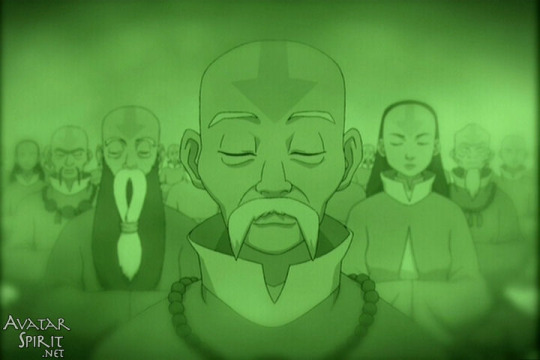
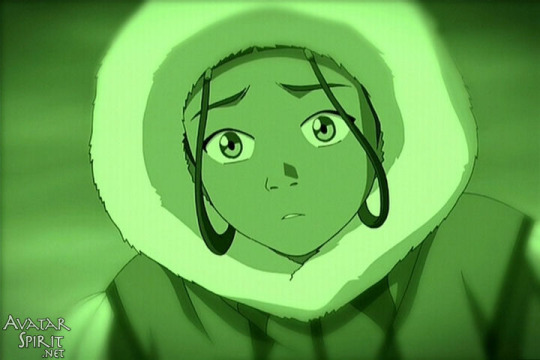
Except Aang cannot let go as he hoped he would be able to. Because his attachment to Katara is selfish, but beyond that his attachment to Katara is a replacement for his attachment to the Air Nomads — and it draws him away from his duties as the Avatar, causing him to embrace an ideal he does not comprehend. After all, the Air Nomads were not perfectly pacifistic either.
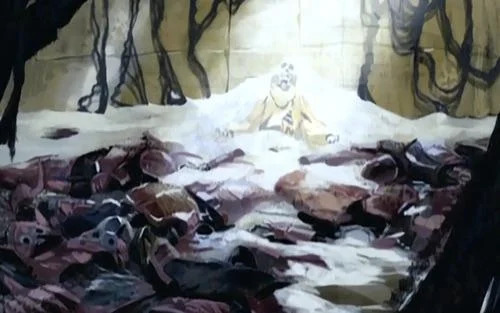
Still, just as Aang refuses to recognize the complexity in the Air Nomads’ legacies, dismissing what he may deem as an act of violence, Aang refuses to recognize the complexity to Katara’s rage and compassion, to her violent and protective nature. In my meta “On Ideals and Idealization,” I elaborate on Aang’s idealization of Katara:
Aang loves Katara, yes, but he is in love with an idealized version of her. In his mind, he holds close the idea of a gentle Katara, a smiling Katara, a compassionate and all-loving Katara. Even though he has seen her darkest moments when she bloodbends Hama - arms bent in disjointed angles, fingers curled as if manipulating puppet strings - it does not tarnish his image of her because, at this moment, she is not the persecutor, but the persecuted.
After her experience with Hama, Aang is there to comfort her and help her come to terms with the terrifying power she now possesses. With her face streaked with tears and eyes widened with horror, it is clear that this is a power that Katara does not want, that it has been thrust onto her against her own will.
The conclusion that Aang draws from this is that Katara’s inner darkness is a separate entity from her inner light, and he perceives this acquired part of her as a blemish on her inherent goodness. As such, in “the Southern Raiders,” when he witnesses how Katara’s anger and grief drive her to hunt down her mother’s killer, he equates Katara seeking closure to Katara succumbing to darkness, tainting her purity and compassion in the process.
Thus, given Aang’s reaction to Katara’s bloodbending, he may be inclined to love her in a piteous, nearly-obligatory manner. He’ll love her as the victim who lost sight and control and he’ll love her as a being of compassion and pacificity, but nothing more. Just like in the Southern Raiders, he may magnanimously grant Katara his forgiveness and his continued love even when she never asked for it. And in the end, Aang and Katara will kiss on the balcony of Iroh’s tea shop, only this time it’s not only “the hero winning the girl,” but “the bright and cheerful boy fixing the broken girl” as well.
This is the ending where Aang clings onto idealization even when it renders him a hypocrite, in the same way he is a hypocrite for shouting at his friends for pushing him to kill Ozai when it is implied he killed thousands at sea in the Siege at the North Pole.
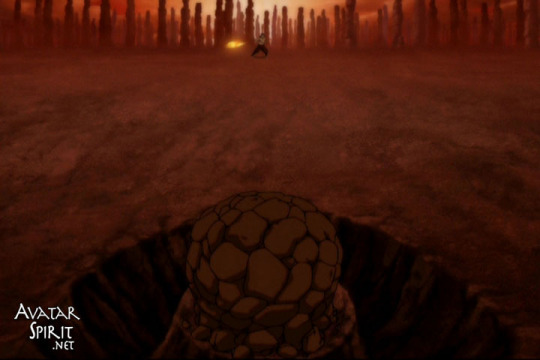
This is the ending where he does not grow.
Note: Aang retreating into a ball of earth as a narrative parallel to the beginning of the series when he was encased in a ball of ice would have been much more powerful if only Aang entered the Avatar State through character growth rather than by the power of the Pointy Rock of Destiny (TM).
Now, let’s consider an ending where Aang’s perspective broadens rather than narrows and where Aang unroots himself from the past, pulling free from stagnance. Let’s consider a hypothetical scenario in which Aang finds out Katara killed Yon Rha. How may he react?
He may not be able to at first, too torn between his belief that Katara only uses violence as a last resort and the reality that Katara uses violence as a means of agency as well. Revenge corrupts; it is a stain that cannot be washed away. There is no reconciling Katara’s previous compassionate and loving nature with this dark path she has now chosen.
Except this is Katara he’s talking about, Katara who he loves and gave up the Avatar State for. Surely there’s a way to save her, right? Yes, just as Aang told Katara before she left, forgiveness is the answer. And while Katara may not have chosen forgiveness in the end, Aang can guide her by example.
The next day, he approaches her with the offer to exempt her from her wrongdoings.
Katara, tired and mournful, looks down at Aang.
“What was so wrong about what I did?”
Inside she is hurting. There is truth to what Aang said, that revenge is poisonous both to the victim and the perpetrator, but it is not poisonous for the reasons he thinks it is. As George Orwell writes in his essay, “revenge is an act which you want to commit when you are powerless and because you are powerless: as soon as the sense of impotence is removed, the desire evaporates also” (Revenge is Sour). There’s no doubt that Yon Rha was despicable, and there’s only a little doubt in saying that his punishment should fit his crime — the only regret Katara may have here is that killing Yon Rha is a meaningless act, for she has already gained power over him in every meaning of the word. Revenge is only a gateway to senseless violence and hatred; it is not a slope from which there is no recovery, and given Katara’s emotional intelligence, she likely has or will recognize this. Although she may feel regret, she needs no one’s forgiveness.
Aang is shocked. “But violence is never the answer,” he stands by, he pleads by. His voice grows quieter. “You know that… you knew that, didn’t you?”
Katara answers him, but it’s all a blur. She says something about agency, protection, and justice. He remembers something about that too, about the fury that burned in her eyes when she declared, “I will never, ever, turn my back on the people who need me!” Then there was the hostility simmering in her glare towards Zuko, the way she muttered that she didn’t trust him, not when he could still hurt them — hurt Aang — again.
Because Katara’s anger and compassion do not simply split themselves into two identities. Instead, they coexist and coalesce into one. They drive each other; they feed into each other; they are two sides of the same coin.
Excerpt from my meta Rage, Compassion, and the Bridge in Between
The beloved ideal of Katara — the one that he thought was on the verge of being tainted, the one that never existed — shatters. But just because it’s broken doesn’t mean Aang doesn’t want to fix it. So in the days leading up to Sozin’s Comet, he tries to pick up the fragments to the Katara-he-knew and piece them together again, all the while avoiding Katara’s mournful (yet resolved) stare. He ignores the way Zuko and Katara share glances with a heaviness as if they were the only two people in the world, full of some significance he cannot grasp. Still, it haunts him like the way Zuko’s touch lingers on Katara’s shoulder or Katara’s hand brushes Zuko’s briefly whenever they don’t think anyone’s looking, reflecting a togetherness escaping loneliness.
But there’s no answer that arrives quick enough to save Aang from his doubt and confusion. All too soon, Sozin’s Comet is upon them, and Aang wanders to another world on the lion turtle's back — but this time when he listens to the past Avatars’ advice, his perspective undergoes a paradigm shift.
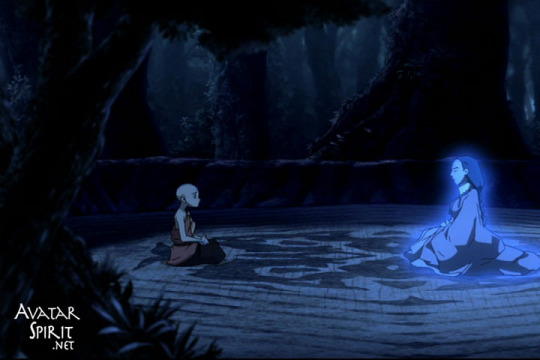
They are right. The Air Nomads that he prioritized, that blinded him to his duties — they do not exist. Their love is still there, pure and human but not all-encompassing, tucked in the corner of his heart. And Katara was the same. She was and is not all-loving or all-compassionate or all-anything, really, because she is more human than that.
This time Katara’s image shatters again. But Aang does not follow the falling pieces to the ground, desperate to find them and force them together again. No, he sees past the remains and sees Katara for who she is. For who she wants to be. For who she can be (around someone else), when she’s not compelled to take on the caretaker role just for him.
(And he thought he was so generous, offering to forgive him. But it was never his forgiveness to give in the first place.)
Aang lets go of his last attachment.
The last airbender lives on, but so does the Avatar.
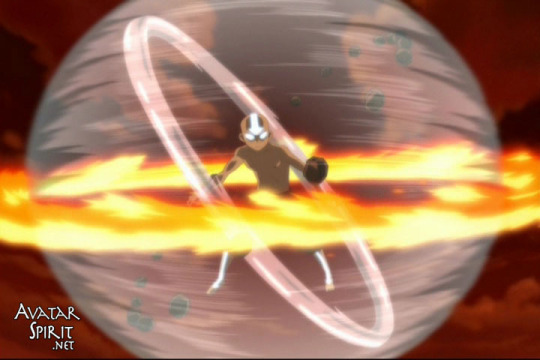
#atla#atla meta#anti kataang#anti kataang meta#zutara#aang#katara#anti aang#of sorts?#my bated breath's posts#my bated breath analyzes#i kind of rewrote aang's arc in the finale in my mind and a little bit of that slipped through#anon you asked a hard question so i gave you a 1.5k+ meta in response#i hope it's everything you ever hoped it could be#anonymous ask#ask#is tumblr hiding this post from the tags again?
379 notes
·
View notes
Text
the jason/piper breakup and jason’s subsequent death
it is a long and angry post so you have been warned
I’m really sick of seeing Jason Grace/Piper McLean slander in their own tag, and I’m really, really sick of seeing people justify their breakup/his death as good writing.
As I’ve been studying literature and text for the past four years at Uni- I can say with absolute confidence that The Burning Maze utilizing Jason and Piper was horrible. Like a bag of shit mixed together then smeared on paper and published kind of horrible. Actually, you don’t even really need a degree to be able to point out the very basic absurdity of them appearing in TBM. So even though I have a paper due on a completely unrelated topic and a lot of homework, I naturally decided this was a much better thing to write about:
Maybe in another world, Rick’s ghostwriters will be better at writing his books. The reason why the Jason/Piper breakup was extremely confusing and done very poorly in the sense of their character arcs was that there was no buildup to the breakup. In fact, I think these two got together off-screen and broke up off-screen. Yet, I’m sure Riordan sat at his desk thinking “now why don’t people just like Jason and Piper?? I give them so much!” Actually, you gave them nothing. It’s also considerably easy to disguise their breakup as logical when it isn’t. Now, people will argue that the basic foundation of the relationship was poorly made because of Hera’s meddling and that’s why they broke up. This is a lazy way to think about it because it’s obvious you don’t care about the characters so you should just say that and go. Hera’s meddling (putting false memories of Jason in Piper’s head and wiping Jason’s brain) really only gave Piper a vague notion of Jason (based on real attributes the Mist pulls) and also gave PERCY and Jason multiple relationships after the switcheroo. But Piper actually meets Jason and then has a subsequent breakdown that maybe he’s not her boyfriend. However, once she gets to know the real Jason (very accurate to the one she knew in her memories because Aphrodite said she could sense real possibilities hinting at their romance), she is still developing romantic feelings for him. It’s implied that the reason why Piper is falling so fast is because the memories she has of Jason are based on the real Jason. It’s easy to establish that Piper has real romantic feelings for Jason, not the made up Jason because the majority of TLH is them getting to know each other. If she felt like there was some confusion on her part about developing feelings for him because of Hera switching Percy and Jason- why did it not come up EVER? The months where Jason and Piper started dating. How about that long ass quest on the Argo? It could have been a valid plot line but it never came up. If it had come up near the end of the series or maybe even if it was a small subplot in the series, it would make the breakup logical, at least narratively. But no, we end Blood of Olympus with Jason and Piper coming full circle with the moment in the stars. Flash forward three years later to TBM where everything (and I mean EVERYTHING) about Piper and Jason are thrown into the trash. They’re broken up due to the false memories and overall I guess it’s implied Piper doesn’t have feelings for him anymore or something? Or the trauma of being in something like that prophecy was a lot for her to handle and she needed some time to figure things out? Yeah of course! Just like when she will go through another trauma (Jason dying for her) and start dating someone new right after. This would be so much easier to read and digest if these things are shown- in their own series and maybe not as a side thing to Apollo’s series. Reading it in TOA was completely out of left field. I know SO MANY PEOPLE were like that makes so much sense! Good for you Piper! But I was like girl, who are you? I feel like I have not spent any time with you and none of what you’re saying is connecting to anything you were like before. Which leads me to believe people just did not like Piper in HOO but just say that and go. HOO Piper is not TBM/TOA Piper. RR doesn’t know how to characterize his own goddamn characters. Furthermore, everything in canon up until TBM implies and directly states that Jason and Piper are endgame. It’s not to say they didn’t have problems that were resolved or that the way they got together was conventional. There was not even a smidge bit of reluctance to admit they were canon endgame- I think RR even had Cupid involved. There was no prediction or even hint of what would happen in TBM in HOO, which is a very big narrative problem. Jason, always isolated by loved ones and quite frankly always shouldering way more than a human can handle dies exactly the way he suffers. There is no growth or even a small lovely moment where we can see Jason.
This brings me to the most unnecessary death I’ve ever read in my life. I know RR’s ego hurt from the complaints about Jason/Piper/Frank/Hazel/Leo (basically a non-Percabeth character) being underdeveloped. I know his ego was fucked when he “killed” Leo but didn’t really kill Leo so everyone was like what the fuck. I know he wanted to prove he is a good writer but like any other bad writer, he decided to jump the shark. And I know he wanted Jason and Piper to be more likable but the fandom really wanted a Leo-esque character. The breakup really happened because he wanted to demonstrate to critics that he could live with couples not being endgame and knew Jasiper was relatively unpopular compared to Percabeth/Caleo/etc. He wasn’t thinking in terms of ‘does this fit what I’ve created’ but in terms of ‘people might be like oh shit this is violent and they’re finally gone!’. I don’t know what idiotic thought process made him reach the point of killing one of them but he obviously got there. See, there is no difference between Jason or Piper dying in TBM. It could’ve easily been Piper who was impaled by Caligula and reminded Apollo “what it’s like to be human”. They were made *that* insignificant in TBM. Pretty much fucking interchangeable. IN DEATH. It also could’ve been anybody else in the world. It could’ve been that cheerleader from The Battle of the Labyrinth. It could’ve been Piper’s dad. It could have been Sally Jackson. Not a single part of Jason’s death was really related to Jason or his growth. Jason was the main/lead from HOO and if he was destined to die (which he wasn’t because RR doesn’t think anything through anymore), he should have died in his own series. That would make his sacrifice more compelling and important, but dying in TOA is just a big fuck you to his character. I think the only equivalent I can think of is if HOO had solely been Jason’s series but RR pulled up Percy to simply kill him and then just kept writing. What the fuck does TOA have anything to do with Jason or Piper? Or even Leo? I usually love when characters make cameo appearances to remind us of the past we loved them in. Kind of like when Lynda Carter appeared as Asteria in WW1984. Conversely, involving them in the plot and then using them as a plot device for the main character- AKA USING YOUR MAIN CHARACTER AS A PLOT DEVICE FOR ANOTHER MAIN CHARACTER IN A SEPARATE SERIES- is not only dumb but it truly makes everything else you’ve written for the first main character devoid of any real significance. Jason was never a fully fleshed-out character, the way he deserved to be written, because RR couldn’t world build as well as he thought and that ‘every single character gets a POV’ didn’t do the legendary thing he thought it did. However, anything that mattered about Jason was pretty much killed in TBM because he was easily killed by a villain that was not even remotely interested in Jason or aware of his existence. What does FUCK does Caligula mean to Jason? Nothing. Did the final battle create a full circle for Jason other than the line “remember?” which is not really related to his amnesia- no. His character arc was about an identity crisis- being pushed and pulled in two directions. Jason barely means anything to Apollo so RR using Jason as a convenient kill to send home a message is also shitty for Apollo. Lead hero characters can die- they sometimes just have to. Marissa Cooper’s death in the OC narratively makes sense due to the nature of the character being a damsel in distress from the very beginning- a foil to her counterpart, Ryan Atwood. But in this case, RR knew he had to shock people to keep getting $$$. I never got the impression RR cared about Jason or Piper, especially since he was incredibly disrespectful and lazy when writing about Piper. (For that- I can link really detailed posts explaining his racism). The truth is Riordan cannot live without putting his characters in relationships- Frazel, Caleo, Tyson/Ella (?), Hedge/Mellie- but he wanted to prove that he could which is why Jasiper broke up.
Piper’s girlfriend in TON- I didn’t read TON for the reasons above and I don’t think I’ll ever read a Riordan book again: I did find out that Piper gets a GF in TON which at first I thought was incredibly neat but then later became angry when I learned it was only months after Jason’s death? I have always wanted Piper to explore her sexuality but RR has this case of never giving important things the development it deserves. He’s incredibly messy and inconsistent when he creates lgbtqia+ characters, usually only including them so he can get credit for including them. He’s never actually explored Piper’s sexuality fully in the series, but he threw her in yet another relationship we didn’t get to read about right after she was almost beaten to death and then witnessed the murder of her ex-boyfriend. If you think that is representation, please rethink that. We don’t get to hear her talk about anything at all, except maybe mentioning the girl’s name. A subtle hint. Just representation is not good representation and it is right that we demand better representation. Don’t settle for less. For fuck’s sake, Riverdale is only really good at queerbaiting but they get so much praise. (Do they? At this point I can’t tell). If we wanted to explore Piper’s sexuality, it could have been done while she was with Jason or even broken up with him in her own series- why didn’t RR explore the nature of being lgbtqia+ in an Indigenous family? He had the chance to demonstrate an awareness of intersectionality through Piper but he fucked up. He had so much to write about. So, people who are yelling happily about that Piper appearance in TON-???
This was long and frustrating to write. But I had feelings.
#jason grace#Piper McLean#percy jackson#pjo#jasiper#jasper#jiper#toa#trials of apollo#Heroes of Olympus
66 notes
·
View notes
Note
Glad to see you’re back to taking asks!❤️ I hope all is well for you!
A bit of a simpler one this time around, I felt like Gülfem closer to the end of season 4 started to come off a bit..ingenuine to me? If that’s the right word? I mean she spent previous seasons partaking in plots against Hürrem and what seemed like hating her or at the very least expressing open disapproval of her actions and what she stood for to..consoling Hürrem’s restless conscience after Hürrem was diagnosed with a terminal illness? I just remember her saying things like she should be proud of the life she lived, that she wasn’t a bad person, that she shouldn’t think of her illness as a punishment etc etc. I suppose we could give Gülfem the benefit of the doubt and say that she saw no point in openly opposing Hürrem anymore (like Fatma or Mahidevran felt towards the end) but why not just leave the palace as they did? Perhaps they kept her around for the sake of the story but I feel like they didn’t do much with her arc past that point, they just did a time jump then revealed to us in a flashback she died? I think I’m just more confused than anything. Why not keep Gülfem’s feelings towards Hürrem at least somewhat consistent like Mahi/Fatma?
I'm fine, thank you! ❤❤ I closed my ask box mostly due to school work, the end of the year exams can be intense heh
I definetly get your sentiments since that sure seems to be an inconsistency to Gülfem's character at first glance. It may indeed turn out as a contrast to the remainder of what we have seen.
It isn't such a big problem for me, however, because we have to take two things into consideration:
Gülfem's stance of Hürrem plays a part in reflecting the tone of the final episodes of S04. The whole last chunk of the show before Hürrem's death did its best in recognizing her alleged legacy in ways it hadn't before. It suddenly began acknowledging her power, showing SS prove considerably more affection than ever before (that makes the most narrative sense out of everything, but still), folk praising her for the first time ever and most notably, various characters in the show, with positive, ambiguous and negative relationship with her alike, either praising her or consoling her. Gülfem is one of the more neutral characters in the castle and the most nurturing one, the one most able to empathize and console. It is only fitting to give her such a role to fit the message the writers want to deliver. Acknowledging Hürrem's legacy just now and like this is truly as much of a copout as it is fanservice, but at least it's not completely out of nowhere (especially the acknowledgment of her fondations) and they do give us some consistency with what Gülfem does along with everyone else in this whole ordeal.
S04 extends on Gülfem's role as a conscience character-wise, besides utilizing it in favor of the narrative voice. In these last episodes in particular, she seems to be the conscience of everyone in the castle, given her nature and that she's the last person left there who could do that. That includes Süleiman, as well as it includes Hürrem.
These things aren't presented in the best way, writing-wise, and could be sometimes more subtle than necessary. Gülfem herself could be a little underdeveloped as a character and has comparatively lesser screentime than the rest of the main and secondary cast. Her conscience is her clear role in the narrative, but her relationships, with the exception of Hatice (and the other sisters of SS to an extent), aren't as well defined. Look at her relationship with Mahidevran, for example: we got hints of their supposed past rivalry, we got hints of resentment, but these hints only turned into an inconsistent mess. There were much more scenes where they were in good terms with each other and anything else was so few and far in between, it only appeared to be a contrast. We got no true perspective of their past in Manisa and Gülfem's more personal opinion on Mahidevran, leaving it only as a static, but pretty good relationship. (which is why I'm grateful that S03 removed this set-up of their relationship, rendering it still not that well fleshed out, but more consistent.)
In a similar fashion, we never got a proper exploration of how exactly she felt about Hürrem, too. What I think I can say with confidence though is that certainly didn't hate her - Gülfem is a very patient and just woman, which I can only admire her for. She is a voice of reason, trying her best to be unbiased in her outlooks and stand for what is right. She has happened to knock Hürrem down a peg, but not because she disliked her, but because she thought she was crossing the line or offending the people she cares about. The closest we got to a look into a tiny resentment of Gülfem's of Hürrem was when Hürrem used her to make Mahidevran lose her rulership of the harem. It's normal that Gülfem would harbor such feelings, knowing that she didn't do anything to Hürrem before that and only supported her about Mahidevran wanting Valide's chambers. Being used in an intrigue like that clearly hurt her and her willing to stand even more against Hürrem was hinted at a little, but once again, that was a very short conflict. It would be a decent transition if the writers wanted that for Gülfem, but they didn't. It would run against Gülfem's forgiving nature at this point to hate Hürrem. Gülfem just is notorious in putting the past behind her. {hence on a thematic note, her backstory and origins not only didn't get revealed to us except for a few scenes, similarly to Mahidevran (Mahidevran got flashbacks, at least), but she, in contrast to both Mahidevran and Hürrem, has already adapted to her present, knowing that she cannot bring back what she has lost. And her adaption has already happened, it's not made out to be a character arc within the series.} Her feelings for Hürrem aren't kept consistent, because there isn't much to be kept consistent. Mahidevran and Fatma both have pivotal dynamics with Hürrem that play a major role in the narrative as they both play a more major part of the story. Gülfem and Hürrem's relationship as a whole seemed to have both its good and bad moments (as Hürrem herself recalled in E133) and the good moments were usually when both consoled someone and Gülfem consoling Hürrem now doesn't seem this strange anymore.
Gülfem also seems to put her own feelings behind her in favor of those of the others, probably in result of her huge loss. She always comforts the others, is there for them and shows her moral support. She seems to identify herself in their own struggles. That, I feel, gives her the ability to sympathize even with those she presumably doesn't like, because she's very open and honest overall. I don't think it's ingenuine, because Gülfem never showed signs of hypocrisy. Not to mention that every hypocrisy there is in the franchise, we know of: either through previously fully established dynamics, direction or character motive. (or at least that's a pattern I have noticed) I don't think they would put Gülfem, out of everyone, in such position. This consolation of Hürrem may have been moulded a bit, but it's certainly not ingenuine and runs in line with who she is. Besides, she did say she forgives Hürrem for every possible offense in E133. I think that clears the whole thing up.
I wouldn't say that Gülfem had no arc at all in S04, as well. [I wouldn't see them leaving her just for the story, either, because aside from E59-63, Gülfem usually didn't move the story in any significant way. They probably left her because she was the moral compass of the palace and she was one of the first characters after all, for her to stay as much as she can.] She doesn't have too much in the way of development or arc in the rest of the show, probably because she didn't have much to develop on her own and the writers didn't want to really flesh her out. The only thing she could develop is her relationships and most of them also didn't leave room for development (not even Hürrem, because she didn't do that much against her, except for the S02 finale, correct me if I'm wrong?), except for one: her relationship with Süleiman. Gülfem wants to preserve justice and Süleiman began to act completely counter of that. It's not a built-up arc, but it's only by S04 where SS's shadiest actions began to reach their peak, so only then would it begin to happen. Because she valued Süleiman before then.
She valued him to the point she dismissed his faults in the strife between his women and asked him the comfort question of whether he is happy with them when he called her to talk in E15. Their joint scenes had their continuation only by S04 where she similarly acted as his conscience after Hürrem's death. For she was the one close enough to him for him to confide in. Many people confided in Gülfem through the series, but Süleiman is one of the people that did it the most and it was as if this consoling went beyond the sheer usual support for her.
And what happens afterwards? The table begins to turn after Bayezid's execution. That angle is looked upon only after the time skip and during the flashback in E139, but it shows by its own merit alone a change, an evolution of Gülfem's opinion of SS and a reverse approach of her role as a conscience: Gülfem is so patient and understanding, but she has finally snapped. She has finally met her limit. In her words to SS in the scene we see how his actions have put themselves in a conflict far beyond what she can bear. She can no longer excuse him, she can no longer justify him.
That scene showed us her realization that he has the biggest part of the blame in the misfortunes in the palace. ("Even leaf cannot fall without your approval!") And she wanted to end him for that. I know it looks like this happened almost overnight, maybe looked a little too edgy and may feel like a contrived attempt to make an exit for her character, but it works well enough with me. Because after all, she has truly went through a lot and that suffering didn't even begin from Topkapı. It's only natural she would try to kill the root of the suffering for good. And here, for once, she stands up for herself, too, along with calling out all the unfortunate and devastating events.
#magnificent century#muhteşem yüzyıl#muhtesem yuzyil#gulfem hatun#hurrem sultan#sultan suleiman#ask#stuffandthangs
7 notes
·
View notes
Note
you totally don’t have to if you don’t want to, but do you mind explaining what makes the prom movie so bad? I had a couple friends that watched it and liked it, but it gave me really weird vibes so I’d already been kind of iffy about watching it
Hooooo I’m going to try to keep this concise because I think the prom both as a musical and as a movie fails in every single aspect and if I listed everything this would be a Do You Like The Colors Of The Sky post:
The Big Thing is that uhhhhh the treatment of gay characters in this show is. Wild. Emma demonizes and yells at and shows no empathy for her closeted girlfriend in a toxic home, and they have zero chemistry while we’re at it. Also the lesbian couple the story is allegedly about is so underdeveloped it’s actually pathetic. The Prom is NOT about lesbians. It is NOT about Emma and Alyssa. This isn’t their story, not even close, they’re like the C Plot MAYBE. We know nothing about either of these people except that Emma sucks and Alyssa is sad, and the story would have you believe they’re In Love but doesn’t bother to show us why even a little bit like I don’t even believe that these people like each other
I found so many bits of this movie wildly ableist and fatphobic? It kind of blew my mind? Also what genius was like Let’s tell a story brave enough to suggest that these white liberals can save the evil homophobic black lady who is a cartoon villain throughout the movie. Like the optics are uhhhhh. Interesting.
James Corden
But apart from being ~~~problematic~~~ I genuinely just think it’s a bad show lmao I don’t find a single song in the score worthwhile or memorable, I think they’re incredibly weak and throughout the watch we kept pointing out which better musical theater song it was ripping off. The writing overall is very poor and not well thought out.
THE COSTUME DESIGN FROM START TO FINISH IS SO HIDEOUS I WANT REPARATIONS
It’s just a mess imo, there wasn’t a single lesbian on the writing team and it REALLY shows. It is tonally all over the place and actively undermines the group it claims to uplift.
This is not to say I got nothing out of this movie. Meryl Streep is genuinely excellent in it even if her character is so inconsistently written, and her kissing Keegan Michael Key was by FAR the highlight of the film. Also love to see Kevin Chamberlin even if he was criminally underused.
6 notes
·
View notes
Text
Star Wars: The Clone Wars (Seasons 1--6), Final Analysis

Well, I made it through.
Let’s be absolutely clear: The Clone Wars (TCW) is not good television. For the most part, it’s not even watchable television. The show suffers from serious fundamental issues in nearly every aspect of storytelling. Characters are underdeveloped and inconsistent; the dialogue is expository and contradictory; the tone is disjoint and jarring; and most episodes serve no greater purpose than to be a twenty-minute vessel to house lightsaber fights.
So I want to put this part of the show to rest before I move on to Star Wars: Rebels (and before returning to watch season 7).
With two exceptions, the show poorly handles twists and reveals. In the earlier seasons, reveals were spoiled mostly due to telegraphing: Captain Sleaze in Cloak of Darkness, Senator Clovis in Senate Spy, and Yolo (?) in Senate Murders come to mind, but there were others. In later seasons, telegraphing was supplanted by “small universe syndrome” as the primary cause of spoiled reveals. In The Academy, a cloaked figure was seen doing shady, back-alley deals, but his identity could only have been the Prime Minister. During the “Ahsoka framed” series, Barriss was obviously the traitor, simply because her character suddenly reappeared after four seasons and there were no other candidates.
Probably the most successfully executed reveal was that of Krell, as his assholeness was at least initially masked as military rigidity. But even so, it was so over-the-top that when the reveal finally came to light, it felt more like an overdue disclosure than a dramatic twist. It didn’t help that, by that point in the show, the format of “asshole = upcoming reveal” had been firmly entrenched into the show’s DNA.
I would argue that the most effective plot twist of the entire show was when the dancer/singer girl shot and killed Ziro the Hutt in Hunt for Ziro. Although irrelevant to the greater story, it was an actual twist because it was strongly implied the opposite would happen (i.e., Ziro would betray the girl). If there is to be a second place, that award would go to Ahsoka’s decision to leave the Jedi Order at the conclusion of The Wrong Jedi. But this leads me into my next point...
Who was the main character of The Clone Wars? If we go by the logic that whoever had the most screen time was the main character, then Anakin probably wins over Ahsoka. But if we go by the logic that the most developed character was the “main character,” then this is a show about Ahsoka. Ahsoka---more than any other character---grows in a noticeable way (from impatient, violent child to impatient, slightly less violent teenager). In contrast, Anakin in Rising Malevolence is the same character as Anakin in Voices (only a little more violent and angry for some reason).
It’s unfortunate that her major character moments were never capitalized on. Intentionally sacrificing herself for the greater good in Weapons Factory apparently led to no lasting repercussions on her character. Her impatience and disobedience led to the deaths of thousands in Storm over Ryloth, but was similarly forgotten immediately afterwards. Even Ahsoka’s major character moment at the end of The Wrong Jedi resulted in her walking away from the show, never to address the implications of that decisions (although I suppose that’s the subject of Season 7).
On a different note, the show was riddled by a shameful amount of “references” and fan service, for reasons exclusively external to the story. These “nods” ranged from the obvious “Obi-wan Kenobi, you’re my only hope” (or whatever Senator Jimmy Smits says in Cat and Mouse) to the innocuous design of a droid or background device.
These “references” are objectively problematic for at least a few reasons. (1) They contribute to the sense that the universe is a really, really small place. Is the Mos Eisley cantina really the only place in the Outer Rim where shady deals go down? Is carbon freezing really the only way to store a person in stasis for transport? How long do Rodians live for anyways? Greedo’s gotta be what, like 80 when Han shoots him in A New Hope? It’s ironic that ultimately, this incomprehensibly large, diverse galaxy actually feels much smaller after watching this series because we keep going to the same twelve places...
(2) “Fan service” is tricky to get right because different people have different memories and impressions of the source material. In result, copying material will oftentimes comes across as a blatant misunderstanding of the original content. For example, to me, Vader put Solo into carbon freeze because it’s what Lando had lying around. It’s not a galactically established method of transporting people. Obi-Wan trained Luke with those laser balls aboard the Falcon because Han had them lying around and Obi-Wan needed to improvise a training exercise to kill time.
(3) "References” and “nods” usually are just a band-aid for a lack of creativity. Some of the better episodes in the initial seasons were just direct rehashes of famous movies. Seven Samurai, Godzilla, Stray Dog, The Most Dangerous Game, King Kong... I mean, it’d be pretty impressive to mess-up stories like these, but it’s concerning that there were just so many episodes made from other people’s stories.
These “references” even seep into the most innocuous of scenes. When Prequel!Wan lands on Mandalore to attempt a rescue of Satine from Darth Maul, one of the Mandalorians takes aim at him, only to have their blaster pushed down by their companion who’s shaking their head. This is a direct reference o the Tusken Raiders on Tatooine when Luke went after R2 in the desert. Even if this scene served an important plot purpose (it didn’t), there’s undoubtedly a multitude of ways to communicate the same thing. Instead, a small reference to the OT is interjected into the show, deimmersing the audience from the events shown. Unfortunately, this is just one (very small) example of hundreds over the whole show.
Let me say something positive. The episodes that worked best (especially early in the show's run) were ones that focused on mortal people, usually the clones. Innocents of Ryloth was one of the first watchable episodes, simply because we didn't have to sit through twenty minutes of unlikable, unrelatable “Jedi” and instead followed around a pair of troopers helping a little girl using their limited abilities. Likewise, Pursuit of Peace was way more enjoyable than it probably should have been, simply because the story was understandable, the consequences clear, and the drama real. Plan of Dissent (when the clones actively rebel against Krell) was also noteworthy for similar reasons: clones we liked must subdue a “Jedi” we’ve learned to hate.
This isn’t to say that episodes focused on the major characters were inherently unenjoyable, it’s just that none of these characters had any room to grow (with the exception of Ahsoka). Dooku, Grievous, Anakin, Prequel!Wan... They were the same characters as portrayed in Episode II and III. As presented, there was nowhere for these characters to go. Dooku was literally identical at the beginning of the series as he was at the end, and the same can be said about the others.
But these are false constraints the writers imposed upon themselves. Grievous was not in Episode II and was introduced in Episode III. TCW could have started him however they wanted and then illustrated his change into the character he later becomes. Who was he? What was his motivation? Why did he hate Jedi so much? The show was handed a completely clean slate to deliver a character from scratch, but instead we were immediately shown “Episode III General Grievous” with zero introduction because fans were expected to already know who he was.
This is partly why the backstory episode to Grievous was so compelling, at least in premise: viewing his home was personal to his story and it represented a chance to learn a bit more about the character and where he came from. Of course, it was mostly mishandled by a reliance on meaningless action, but the high ratings of that particular episode suggest there was room for quality television here, it just was never capitalized on.
Instead, we have completely static caricatures, especially for minor characters from the movies. Admiral Tarkin, Admiral Ackbar, Greedo (among others) were written out of cardboard and their roles in the plot could have just as easily been played by anyone else (there was nothing unique about their roles that required them to be these characters).
This is a shame because a lot could have been done with the established premise to really focus on Anakin, his motivations, and his relationship to his Padawan. I would have been okay with a lot of backtracking if it meant I could begin to grasp his “fall” to the Dark Side. Instead, I’m honestly more confused than ever about his motivation.
One argument is that Anakin joins the Dark Side because he like, “loves” Padme (or whatever). However, what we’re shown in this show---consistently, clearly---is that Padme and Anakin have a toxic, dysfunctional relationship. He is uncomfortably jealous and rarely trusts her. They argue nearly every time they’re together. Their “love” (or whatever) must remain secret, equating their relationship to something “wrong” or even “illegal” that must be kept secret, even on the verge of death. In a later episode, Anakin orders Padme to listen to him because he’s the “man” and, as his wife, she doesn’t have a say in the matter. This is clearly a broken relationship and the best result is the one that actually happens: They stop seeing each other. Anakin wants to save this woman from a vision? Why?
This brings up a second point, which is that Anakin can’t stand the pain of losing someone. His desire to protect those close to him may be Anakin’s only redeeming trait. He has a single selfless scene (in the entire show) during the opening of Jedi Crash where he sacrifices himself to delay an explosion and save his companions. I want to stress that any other scene where Anakin saves or helps someone isn’t done because he’s a good person, it’s done because he’s a broken person. It’s done because he, personally, would struggle with the emotional toll of knowing he allowed someone close to him to be hurt or die. In other words, he’s doing nice things for selfish reasons.
As far as I’m concerned, Anakin has always been Darth Vader. He is given choices between being a Jedi and allowing a lot of people to die, and he enjoys choosing the second. In Ghosts of Mortis, we’re shown that the threshold between “Anakin” and “Darth Vader” is disconcertingly low, requiring only a few choice words and less than a minute to convert him. In short, what I’ve learned from TCW regarding Anakin Skywalker is that he was an unlikable dick, and his “turn” to the Dark Side was just a long-overdue reveal.
While the later seasons worked towards the events in Episode III in a way that at least made a bit of sense, earlier seasons were focused on adult-themed wacky hijinks. In a way, the show almost would have worked better as a kid’s show, but this was clearly meant for adults: politics, war, slavery, and lots and lots of horrific violence. In comparison, the silly adventures of Star Wars: Resistance worked well because the show didn’t take itself too seriously. It was very clearly, from the start, a lighthearted show about kids going on fun adventures. In contrast, TCW suffered because its themes were adult in nature, but was portrayed as a Saturday morning cartoon show. The humor was misplaced, the tone disjointed from actual events, and the violence excessive.
Let me say a few words on the “Jedi.” Initially I labeled them as overpowered (OP), because in earlier episodes they seemed invincible and dissolved tension in every scene. Later, we see a slew of them get cut down as plot fodder, even against widely different situations. We see Luminara and others push through hoards of droids only to see “Jedi” Master Yoda-like dude get taken down by a dog. We watch as Fisto *heh* powers through entire battalions and the cone-head guy counting coup against an army, only to watch as pink girl gets shot in the face by a single clone who stands in front of her for several seconds before pulling the trigger.
It’s nearly impossible to feel tension in these scenes because the metrics for judging the true strength of a “Jedi” keep shifting as a function of the plot requirements. Anakin suddenly forgets how to use the Force when the plot needs his help to fake some drama. Prequel!Wan pointlessly fist fights with a slaver cat for an hour until the plot needs him to get back up again and OP everyone in the room. Even their ships are only as strong or weak as the plot needs them to be. Plo Koon’s fleet is devastated in seconds in order to portray the Malevolence as being a threat; Anakin’s fleet powers through a larger force three times its size because Anakin’s like, really mad about something.
Secondly, the “Jedi,” in general, were unlikable assholes. They were consistently portrayed as violent and ignorant and I struggled to understand them as real people. Frequently, we witnessed them torture victims, default to a lightsaber to solve problems, and enjoy death to the point of counting coup against sentient life forms defending their homes. Anakin threatened civilians with his lightsaber. Ahsoka was annoyed when she’s asked not to murder a defenseless creature in Jedi Crash. Prequel!Wan and Anakin team up to hurtle enormous rocks into a beaten monster in Dooku Captured. A trio of Jedi Masters mentally gang bang a shackled Cad Bane. They supported state terrorism when it suited their needs, but agreed to abandon their friends for political reasons.
I mean, these are not good people...
This is a shame, because my impression of true Jedi comes from Luke, Yoda, and Obi-Wan in the OT, as well as the expanded universe novels that take place afterwards. It always seemed to me that being a Jedi was about conquering oneself, one’s fears, and learning to use the Force to selflessly help others and let go of all worldly attachments. You know, like the Buddhists they were originally inspired by. I always had the impression that the Force was extremely powerful and that Yoda was only showing Luke a portion of what was possible. That the Emperor was only using Force lighting to toy with Luke. That Vader only Force choked his officers because it was visually intimidating and kept them in line.
Instead, we’re treated to some garbage about how a “Jedi” is nothing greater than an actuator to swing around a lightsaber. When Luke enters Jabba’s palace in Jedi to rescue his friends, it’s not with lightsaber swinging, cutting shit up, flipping around like an acrobatic monkey. Imagine Anakin and Ahsoka in the same scene. They’d blaze through the palace corridors before Force choking Jabba as the Darth Vader theme plays. Forget the rancor, these are demigods. They have lightsabers. Have you seen them? They go “woosh woosh.”
In short, there was little to look up to in terms of a “hero” character. I can see how children can look up to Luke as a role model, someone they want to emulate or play with as a toy, but looking up to Anakin? Ahsoka? Hey kids, wanna learn to become a psychopath? First, you use your power to abuse those who are weaker than you. Then you need to get really really angry and uncontrollably choke someone, preferably your sister or one of your cousins.
And so, for a Saturday morning cartoon show, it is very unclear who we’re supposed to care about. I liked when Ahsoka went against Anakin because I hated his character so much. I liked everything with Hondo, a pirate. I liked Ventress a little, because she was actively seeking to kill the main characters. I liked some of the clones, but I don’t know which ones because they all looked the same. I cared about Darth Maul because I’m honestly a little worried about him, especially after the loss of his brother. I kinda liked General Grievous just because he hates the “Jedi” and was therefore relatable (even though the reasoning was never explained). And... that’s it.
At no point did I ever “look forward” to the next episode. I painfully died a little on the inside hitting the “watch next” button every single time.
This “review” is already way too long, so let me summarize by applying my five-star rating system (developed for movies) to each episode. In review:
5. Amazing, classic, culturally important. Something everyone should watch.
4. Great; very well done, no significant flaws.
3: Entertaining with only minor gripes/criticisms.
2: “Watchable,” but suffers from flaws and has some poor parts.
1. Uncomfortably bad; suffers from serious flaws.
0. Painfully bad, would actively fight against being forced to watch a second time.

The 3-star episodes were:
Hostage Crisis
Lightsaber Lost
Pursuit of Peace
Carnage of Krell
The Wrong Jedi
Hostage Crisis was the introduction of Cad Bane, Lightsaber Lost was the remake of Stray Dog (and the only episode to include a real Jedi), Pursuit of Peace was the random Padme/politics episode that was strangely well-executed, Carnage of Krell was the reveal of Krell as a bad guy and his clones working to apprehend him, and The Wrong Jedi was Ahsoka leaving the Jedi Order (and the only episode to include a true character moment).
Also, I scaled the IMDB ratings of each episode to my ratings and then detected outliers in their overlap. In other words, I wanted to answer the question, “which episodes did I rate the most differently from others?”
Turns out, I rated every single episode lower except for seven. Those seven were:
Mercy Mission (+1.853) - R2 and 3PO discover an underground world with ents. This one is universally panned by “fans,” but was a competently handled episode apart from the disappointing resolution.
Pursuit of Peace (+1.382) - Padme struggles to win support for a Senate bill. Another competently handled episode that focuses on Padme and politics and is ranked low by “fans.”
Lightsaber Lost (+0.6471)
Weapons Factory (+0.4118) - An average episode with a dramatic scene of sacrifice by Ahsoka and her “friend” Barriss.
Shadow Warrior (+0.3824) - Grievous is captured during some dramatic moments on Naboo.
Hostage Crisis (+0.3529)
Front Runners (+0.0882) - One of the rebels episodes, I don’t remember which.
In conclusion, Star Wars: Rebels is next and I am somehow still alive.
16 notes
·
View notes
Text
Leaving Canon Behind
If you’ve seen this post and this post and this post you probably saw this coming:
I’m officially unmooring Young Justice: Deathly Weapons from canon beyond Season 1.
I used to have some patience for Season 2. I like a few of the new characters and, while a lot were frustratingly underexecuted and wasted their potential, I did think some of the ongoing character developments could be interesting.
But the more I think about it - especially with the context from Outsiders - the more unhappy it makes me. I’ve though about how you might fill in the seasons, what would have to happen to get them to that point and reconcile the character inconsistencies, and it just feels so depressing.
Season 1 gave us a team of teenagers who wanted to prove something and did. They made mistakes and butted heads, had insecurities and kept secrets but ultimately they learned to trust each other and communicate, and found a place where they could be accepted for who they were and genuinely make a difference.
But then the timeskip happens and when we come back, they barely feel like friends anymore. They haven’t learned from the lessons of past seasons, they rarely communicate before it escalates to a fight, they don’t trust each other even when they have no reason not to, they rarely spend time together and the new characters have such little development, screen-time and chemistry with the old cast that it doesn’t feel like they’ve forged any genuine relationships, let alone ones strong enough to replace the bonds they’ve lost. (Tim Drake is Robin because he’s Tim Drake in the comics and no time is given to his character or relationship with Dick beyond that - and the same for Jason, Babs, Cassie, Steph, Raquel and 90% of the newer cast who you’ll only understand or care about if you already care about them from somewhere else). Somewhere along the way they all just drifted apart, went through so many terrible things that they broke, forgot themselves, forgot their friendships, forgot what they’d learned, and instead of healing or growing or coming together they came back so much lonelier and unhealthier and unhappier as people.
And then Outsiders makes it all the worse. They again haven’t learned the lessons of the mole plot, none of them meaningfully communicate outside of arguments, Conner and M’gann never properly resolve their relationship-breaking conflict from the first timeskip, what happened to Wally is completely timeskipped over except for Artemis and Dick who mourn in the most trite, generic, impersonal way possible with no care given to who he actually was or the details of the relationships they actually had. They don’t respect each other, don’t trust each other, don’t even really seem to understand, take the time to reflect on or try to know each other anymore.
Dick, Bruce, Kaldur and M’gann are at this point liabilities to the League; willing to distort and subvert their positions, misuse their power for personal gain or as they see fit, lie to the people closest to them, manipulate younger heroes, reduce their colleagues’ autonomy and deny them the ability to give informed consent, and avoid accountability for their own actions. And considering how little the lessons from prior seasons have stuck in the past there’s no reason to believe they won’t do so again. I never thought I’d reach a point where it feels like the heroes would be better off without the original cast.
Meanwhile the villains’ long-term plans are contradictory, unclear and incoherent. They don’t destroy the League in Season 1 because they apparenlty “need them”, but then they don’t do anything to capitalise on their disorientation or further their plans for 5 years (except for Klarion taking a short side trip to do some magic-tablet shopping so that a poorly-rendered videogame can happen and they can retcon-canonise Kaldur’s father and Tula’s death), because they’re supposedly waiting on some uncertain alien arrival that ends up endangering the world they want to rule, but then in Season 3 they want to regulate metahumans and we see Klarion knows how to activate meta-genes with magic so if they already know about that then why not use Starro to frame the League and get that ball rolling in Season 1? Earth already has a galactic presence so why do they need to rely on random, incredibly hard-to-predict aliens? How on any planet does the uncontrolled abject chaos of Outsiders benefit their supposed “evolved earth” in any way? It’s impossible to figure out the stakes and tension of a win or loss when no-one has personal goals and the final prize is so unclear.
In the end, this is a show about hopeful, promising, collaborating teenagers who grow up to be miserable, isolated, irresponsible, emotionally immature adults whose complete failure and refusal to trust or communicate with others costs them the very team they worked to create. About increasingly underdeveloped, inconsistent, narratively interchangeable and uninteresting characters who you’d barely know were friends if the story didn’t insist it was so. About a world that’s getting worse and more volatile, less worth saving with each season. About villains whose plan doesn’t make sense and who have only not been stopped because the heroes are so apathetic and unmotivated that they’ve never tried to proactively uncover or counter their long-term strategy.
A story that ultimately goes nowhere and says nothing, dragged out at the hands of creators who openly don’t want to give it an actual ending at all. All the problems with Dreamworks’ Voltron and BBC’s Sherlock and Tite Kubo’s Bleach rolled up into one great crescendo of cynical, uncaring, wasteful narrative tragedy.
As a fan-author, I can’t bring myself to do this to these characters.
I’m upset because I can’t do anything to change the course of canon. I’m not a shipper, I’m not a theorist, I don’t expect specific things to happen... I just wanted some quality, some answers, for any of it to mean something. But I couldn't even get onto their horribly anti-consumer streaming service to support it officially back when I still hoped for a turnaround. I can’t make Weisman or Vietti or their creative team or the DC executives care about narrative construction, this story, or make them respect their audience and characters. And at this point even if I could the show’s just too broken to salvage.
All I can do is take the parts that had potential and try to make something different.
#That's it#I'm officially out#I'm done dwelling on and being mad about disingenuous condescending lazy writers and their disingenuous condescending lazy choices#Since they aren't going to be bothered respecting or putting out quality work I don't feel any need to respect or listen to their opinions#If I start making errors in details about Season 2 in YJ:DW don't bother correcting me I have not am not going to rewatch it anytime soon#3WD#Young Justice#Young justice: outsiders#young justice salt#Grandon Salt#Outsiders salt
30 notes
·
View notes
Text
Detroit: Become Human - Review (PS4)
10/7/19

Developed by Quantic Dream, released May 2018
Quantic Dream is a French studio, making a name for themselves with narrative and character-focused games. These titles sometimes resemble more of an interactive digital film, rather than a traditional video game. Indigo Prophecy (Fahrenheit), Heavy Rain, Beyond: Two Souls, and now Detroit: Become Human consist of their releases. David Cage, the writer and director of these games (and founding member of Quantic Dream), seems to have a strong fan base, but many people think he is overrated or controversial. Personally, I’m a fan of his games, but feel like the formula that the series has stuck to for a decade and a half hasn’t evolved enough over time. Detroit: Become Human continues the format of multiple protagonists, quick-time events, player choice, and depressing stories focusing on dark journeys for its characters.
Detroit: Become Human is split between three heroes: each an android of the near future, who endure perils of awakening from tool to sentience. Kara (Valorie Curry) is an android who runs away with her owner’s daughter Alice after witnessing physical and emotional abuse from her father. Conner (Bryan Dechart) is an investigator android, working for the police department, specifically tasked with hunting down androids who have rebelled from their programming and strive for independence called “deviants.” Lastly is Markus (Jesse Williams), who becomes a revolutionary of the android race after being destroyed and left for dead in a junkyard. The story switches between each of these characters, and there are tons of directions the story could go for each person, making for excellent replayability.
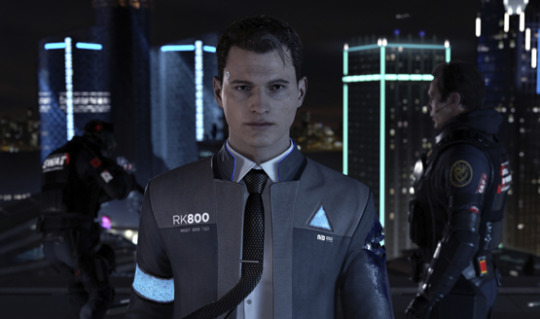
If you’ve played any Quantic Dream before, you’ll know exactly what to expect with this game. This is the entry that seems least evolved from prior Quantic Dream games, which is slightly disappointing. The story begins with Conner negotiating with a deviant android who is threatening the life of his former owner. This acts as a great tutorial hooking you to the story, teaching the gameplay mechanics, and demonstrating consequences of what you do. My only problem with this from a story perspective, is that we immediately see androids evolving past their programming, and achieving sentience. This is one of my problems with the game: there is little to no explanation on what makes them deviate, referring to it sometimes as a glitch in the software, simply it being there all along until the android discovers it (or being automatically “awakened” by a touch by a deviated android as we see Markus doing for others).
The rules of the androids are underdeveloped and inconsistent, and its one of the things that broke my immersion. For all the time we spend playing as androids, there are many things that got little to no attention in favor of drama and plot. I never had a good idea for what their physical and mental limitations were. Sometimes and android would have a skill such as instantly transferring their consciousness into another body simply by touch, or had extreme reflexes, but these skills not being used in the story except for when it’s convenient to the plot. I don’t need the game to be pure exposition, but a lot was focused on that could have been better served making sure the rules and technicalities were defined.

The stand out feature of Detroit: Become Human, as are with other Quantic Dream games, are its graphics. There were genuinely several small moments where I forgot I was playing a game, and was convinced I was watching a live-action scene. It’s obvious the voice actors also did the motion and facial capture to bring their characters to life. This is the case with most of the characters in the game as well, not just the three main protagonists. Everything from man-made objects to weather effects look perfect and incredibly realistic. Even skin tones and clothing, something most games struggle to make look realistic, constantly impressed me. Lighting, animation, and virtually all other visual effects are excellent, and probably won’t be topped at least until the next generation of gaming.
The same complements could be said for music, and overall emotion the game can deliver. David Cage knows how to build a scene, even if it doesn’t make perfect logical sense. Many chapters (out of 32) swelled me with emotion, a combination of great directing, acting, and animation. You really do feel like part of a major civil rights movement by the end of the game. It makes me think if the game would have been much better if it dropped its sci-fi angle, and portrayed an actual revolutionary period, not having to worry about making up rules for its fictional setting. On the flip side, a few chapters did feel monotonous and boring, and I wanted them to end as quickly as possible. Most of these chapters happened to be of Markus’ story. Once he begins a search for the android revolution headquarters, he is made its leader for no special reason, other than he is the player’s character. He came from a great life and there’s no particular reason why he was made this big influential person.

My favorite character to play as was Conner, mainly because his character felt the most robotic and android-like. Seeing him remain analytical, or try to remain analytical, despite the change around him, was the most interesting story to be a part of. However, the game is also stuffed with cliched characters, ones you could read the personality of simply by looking at them. Hint: if a man is overweight, has a beard, and has slick hair, he’s a bad guy, or at least a douche bag. The game truly runs the spectrum of good and bad characters. A particular character that I felt was pure cringe was Conner’s boss Lt Anderson, a drunken, pessimistic, suicidal, lose canon cop who has a dark past and hates androids. Every scene he’s in I felt like I’ve seen a hundred times in other media, even if he was voice acted well.
Detroit: Become Human is better than the sum of its parts. Like other Quantic Dream games, this is a narrative and character driven experience that will fill you with all sorts of emotion, empathy, and conflict, but contain some UI and story fallacies that I couldn’t always ignore. The best complement I can give it, is I found it hard to put down. This is one of the more meaty Quantic Dream games, and I discovered it difficult to stop playing from one chapter to the next. I was invested all the way through, and saw dozens of multiple paths I could have taken than the ones I chose. The game even gives you a thorough flow chart to truly show you how many outcomes there were in every given chapter, and it makes me want to take opposite paths next time I play in the future. You could spend a lot of time uncovering every scene, or at least the majority of the scenes that have been made for the game. This is a David Cage game through and through, which should tell you exactly what to expect.
7/10
#quantic dream#david cage#detroit become human#detroit#ps4#exclusive#sony#indigo prophecy#beyond two souls#heavy rain#the nomad soul
8 notes
·
View notes
Text
And they didn’t come back from the war
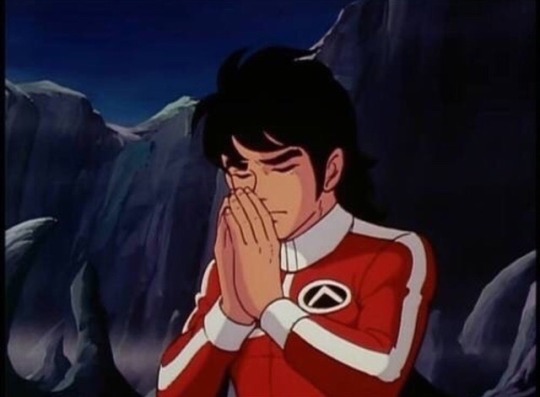
A list of plot points that never got a proper resolution or any resolution at all, inconsistencies and other things that frustrate me in VLD
Warning: really salty and long
So.... on the top of my head:
We still don’t know what Operation Kuron is about. Why did Haggar needed clones of Shiro? What kind of future did she have in mind for him? We will never know, because this plot point was thrown away just like Jiro
I know it has been said hundreds of times but...they just never mention Jiro again. You guys were playing monster and mana with him. Then he tried to kill you. Then he died and you used his corpse to host Shiro’s soul. That seems like a lot to process. Unless you’re in vld, then you just shrug and move on
They moved on so much that they forgot to have emotional reactions to things happening to them. Which made them look cold and uncaring. Which is not a good look for protagonists. This has been a consistent problem since s3
They moved on so much, Keith was the only one still looking for Shiro in s3 while the others didn’t bother. Can you feel the friendship tonight?
Eight seasons in, and the paladins don’t always look like friends. The comment Keith made in The Journey Within hurt because it rang true. Their friendships is underdeveloped and the strongest friendship in the entire show got tossed for... what exactly? A wedding added in the last minute?
For sale: Lance’s Altean broadsword, never used
I still don’t know if Narti was a willing spy or not. I still don’t know why the writers thought the ‘betray Lotor except not really it was just an act haha’ thing was a decent idea
Keith spent two years on a space whale with his mom but we never got to see meaningful conversations between them, only shards of them. Did Keith’s anger and loneliness from being an orphan just disappeared like this? Dermatologists hate him
Shiro’s floating arm is ugly. His new look in s8 is uglier. Shiro, sweetie, I’m so sorry
Regarding the conditions to pilot the black lion: did we seriously go from ‘a leader whose men will follow without hesitation’ to ‘you’re perfect for the black lion because you’re Galra like me’ ?! Shiro never stood a chance.
While I’m on it: Shiro and Keith never talk about the black lion again despite Keith making it clear he didn’t want to pilot it. Somehow Krolia helped him get over it. I guess
They never talk about the Black Paladins fight again despite Shiro nearly killing Keith. Pfft, yeah it wasn’t even that big of a deal anyway. Tis but a flesh wound!
Apparently Shiro was supposed to teach Hunk how to be a diplomat? Where did that plot point go?
The BOM and Voltron not communicating in the Kral Zera was dumb af
I’m neutral towards Keitor but damn, we have more than 60 episodes in vld and still not two minutes to spare for these two to talk? Hard to be a keitor stan in this economy
Lance’s awful behavior towards Keith is never brought up again because......These guys like to move on. They have a degree in moving on.
Coran tells Lance hes not good for Allura because he’s not Altean so of course he magically becomes Altean. Yeah this is totally how genetics work I read it on the internet
The complete annihilation of the found family theme is just fascinating to watch. In a morbid way.
Shiro has no blood family, unless you count the hundreds of clones that turned into ashes. This is just mean
We had to wait until s8 to have a name for Allura’s mom
We see Allura say she has no family and no home. We see her cry, struggle with nightmares, screams...and then she dies and joins her family. Here, have some salt on these fresh wounds
Remember the thing about Keith quintessence sensitive? Neither does vld
Macidus who?
How did Ezor went from ‘hihi lets torture children :3’ to ‘violence is bad’ ? Well.....it was written on the script.....
Veraxca has more chemistry than Shurtis and that says everything
The thing with the Colony is still kinda confusing. What the fock was Lotor doing to these Alteans? Well I hope you didn’t plan to ask him, because he’s a rotten corpse now
The way they reused past monsters, locations and plot points felt....awkward. I get this was supposed to be an hommage, but I saw lack of creativity instead.
I was waiting for an epic Haggar arc and battle but the paladins just told her ‘killing is bad’ and then she’s crying and repenting? That’s it?
I know Lotor has done terrible things but I thought he wouldn’t....you know....die offscreen in the rift. Well.....At least he had the dignity to cry in private
The lions used to have a personality. Where did it go?
I hate how vld is punishing me for loving both Keith and Shiro. I also hate how vld is punishing Keith and Shiro, its favorite punching bag
S8 had too much filler
Everyone forgot about Naxzela, even though Keith almost died in a desperate attempt to save everyone. Thank you guys!
Allura is supposed to be the only one to have the power to open wormholes yet and in one episode in s8, Shiro orders Coran to open a wormhole. What is the truth?
We really went from ‘nothing will happen to you’ ‘if it wasn’t for you my life would have been different’ ‘Shiro was the only one who never gave up on me’ ‘I love you’ to not a single fucking friendly conversation in s8. A strong friendship between two of the main charas is sooooo boring. Let’s add more explosions
Allura is punished for.....well everything. Being Altean? Wanting to be in love? The audacity! Have some death instead.
And the paladins are having a fucking picnic near her memorial! Do you also want to put Christmas decorations on her face?
Lance is punished for daring to be a human in love with an Altean. He will live with the constant reminder that he couldn’t save Allura and stay by her side. Because that’s the law of equivalent exchange in alchemy
Luca dies in the very episode we learn her name. She was too cool to live
Allura is only allowed to be close to two Alteans but even then she’s on thin fucking ice
Alfor: Coran pls take care of my daughter. Allura: *dies*. Alfor: what did I fucking say
You know things are bad when you genuinely want more Slav scenes
#thats it for now lmao#voltron spoilers#vld spoilers#voltron salt#voltron meta#vlds8#this is the bad timeline
68 notes
·
View notes
Text
Rachel Lippincott: Five Feet Apart | Lara


Can you love someone you can never touch?
Stella Grant likes to be in control—even though her totally out of control lungs have sent her in and out of the hospital most of her life. At this point, what Stella needs to control most is keeping herself away from anyone or anything that might pass along an infection and jeopardize the possibility of a lung transplant. Six feet apart. No exceptions.
The only thing Will Newman wants to be in control of is getting out of this hospital. He couldn’t care less about his treatments, or a fancy new clinical drug trial. Soon, he’ll turn eighteen and then he’ll be able to unplug all these machines and actually go see the world, not just its hospitals.
Will’s exactly what Stella needs to stay away from. If he so much as breathes on Stella she could lose her spot on the transplant list. Either one of them could die. The only way to stay alive is to stay apart. But suddenly six feet doesn’t feel like safety. It feels like punishment.
What if they could steal back just a little bit of the space their broken lungs have stolen from them? Would five feet apart really be so dangerous if it stops their hearts from breaking too?
“Everyone in this world is breathing borrowed air.”
What's worse than being a teenager, but spending most of your days in hospitals and scrolling through your social media, watching your friends on a trip you were supposed to go on? Or just sitting and thinking about it, counting your breaths, until the disease you’ve been fighting for years takes them away from you. Will and Stella are fighting cystic fibrosis (CF), a genetic disease that affects lungs, since they were little kids. A few years ago, Will’s lungs got infected with bacteria B.cepacia, which only made things worse and destroyed his already slim chances of getting new lungs. Stella does everything to help her parents stop worrying, which is hard when they’ve just gotten divorced after her sister died. Cfers need to stay a safe six feet from each other at all times, so it won’t come to crossing-over of their diseases, but when Will and Stella start falling in love, those six feet start looking way to far.
When starting this book, I was hoping for a nice and cute romance novel, but all I got was a bad attempt at TFIOSing. The only reason I cared for reading it was that it raises awareness for a disease I haven’t heard of previously. The author had a pretty good idea, but unfortunately, there is a long way from a good idea to an inspiring book. I find it interesting to read about a disease where patients can’t stand closer to each other than six feet and it had a lot of potential to become a sad-ish and slightly heartbreaking story, but when ran out of ideas, author just turned to unnecessary drama and bad underdeveloped romance that made me want to dig my eyes out.
First of all, there is too much inconsistency in character development. Let’s go with Will. It’s bad enough that Lippincott started with a bad boy I-don’t-care-for-anyone-and-want-to-die trope, but also made her character FORGET his personality the moment he met the girl. Will is kind of sick of hospitals and can’t wait for his eighteenth birthday to get out of all treatments and travel the world instead of waiting for a cure that may never come. I can see why he thinks that, and combined with his complicated relationship with his mother makes him an interesting character-except Lippincott decided to go all basic bad boy and added sarcasm, dark hair and blue eyes. So Will hates his doctors and goes a long way to break as many rules as possible, but five minutes after he meets Stella, he gets all swoony eyed and starts shoving pills down his throat. How about no?
Stella is a complete control freak and does everything she is told to do. She loves her parents and does everything to in order to save her lungs, which is kind of controversial since she feels like they shouldn’t go through the process of losing another child. I actually think this is a pretty dumb reason to make a character feel guilty – because her sister died while bungee-jumping, while she stayed at home because she was SICK. And now she feels like it’s her fault Abby died because she wasn’t there? Basically, Stella feels obliged to live, so her parents won’t get even worse than they are now. Well, if we put that aside, there is again, a problem of Stella FORGETTING her personality after falling for Will, and *spoiler* deciding she doesn’t want her lungs after all and she’d rather die hugging Will or something. Nice. It was also totally realistic how devastated she was after Poe died, but forgot about him 10 minutes later.
So, yeah, sorry for the rant, but I was completely and utterly disappointed with this book. I’d like to watch the movie only because Cole Sprouse is acting.

6 notes
·
View notes
Text
Why the Jon/D*any romance doesn’t work (Part 3)
When everyone and their mother has a different take on the same line of text
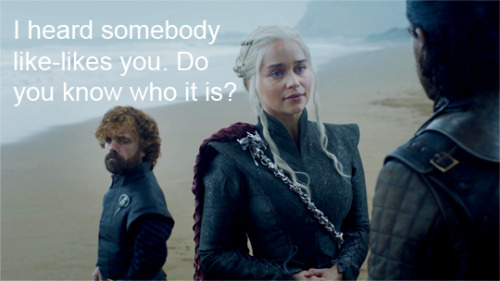
I must warn you in advance. In this 3rd post in the series (1, 2) we will go down the rabbit hole every woman has found herself in while reading her Tinder messages trying to extract some sort of meaning from a seemingly unrelated string of emojis.
Yes, boys and girls, now is the time to try and answer the all-important question that has plagued womanhood since the beginning of time: What does Jon mean when Jon says words?
Answering this question is extremely difficult since most of what he says can be interpreted in different ways. People have chalked it up to bad writing, rushed storyline and the actor’s limitations but is that really a fair assessment?
When analyzing the Jon/Dany scenes more closely, you begin to realize that they work on multiple levels both plotting wise and emotionally. It’s that both the direction of the scenes as well as the actor’s mannerisms aren’t what people expect them to be in that situation. The writers aren’t doing a bad job at presenting you a generic romance, they’re working overtime to both give you the basic structure of said romance while at the same time subverting every trope that they employ.
When trying to take things at face value and analyze the scenes as romantic in nature, the more I was hit with lines upon lines of dialogue that were vague, banal and impersonal. I started envisioning my scriptwriting editor taking out her red pen and cutting out these lines with notes like: what does that even mean?!? Because no editor in their right mind would’ve let this dialogue and these scenes as they are.
So why were these allowed to be filmed into a production of this level? My explanation for this is that these lines and scenes, while uninspired and unflattering to the character or the actor forced to speak them, do have the advantage of allowing the audience to read whatever they want into them, which they will because of how hotly anticipated this ship was. They’re simply allowing you to get tangled in the web so they can pull the rug from under your feet in season 8.
It might seem like I’m exalting the Ds writing abilities to extraordinary levels. But I’m not. It’s not that brilliant, to be honest. It’s a trick, nothing more. And they do it because they can. No other TV show could get away with inciting a ship this way only to annul everything put on screen later on. No show except Game of Thrones and no other ship except Jonerys. Why? Because Jonerys didn’t need to convince people to root for them, those people were already on board the ship long before Jon and Dany danced the devil’s tango. This has been one of the most hotly anticipated romances in TV history so the scenes only came to enforce what people wanted to see.
So do the writers really have anything to lose by trolling us? It doesn’t matter if Jonerys is real or fake, underdeveloped or the world’s most epic romance., everyone on planet Earth will still be tuning in to see every episode of the next season. If the Ds decide to confirm their fans dreams, then everyone who isn’t onboard will have to shrug off the inconsistencies and move on. If the political!jon theory is revealed in season 8, they will be hailed as the greatest twisters in the history of twisting. Every TV critic will write about it, will publish think pieces and then one day they will stumble on to Tumblr and discover my metas and I will become famous the world over …. Hey, a girl can dream, right?
So, let’s forget for a second that Dany and Jon were the ship that broke the internet and let’s look at the rest of the island scenes keeping in mind both the romance but also the possible subversion of said romance.
Scene 6:
youtube
Happy to report that Dany did not ask Jon to bend the knee in this scene.
Yay!
Progress!
Sort of …
There are 3 major things that are wrong with this scene in terms of the romance subplot:
1. Jon’s reaction to Dany’s temper tantrum.
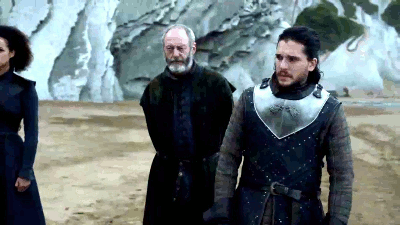
He looks like he’s about to send her to her room, with no supper. Btw, I hate it when people say that Kit Harrington is a bad actor. He might not be acting out what people want to see but his micro expressions are pretty on point.
Jon isn’t wrong in being frustrated by Dany’s public humiliation of her hand. However, it does undermine the romance, particularly since Jon’s reaction goes unnoticed by Dany. And the whole thing could have been avoided had the people behind the camera simply not shown us his reaction at all. These types of reaction shots are not filmed simultaneously with the rest of the scene so it’s actually a lot of extra camera work, positioning and actors doing the same scene over and over again just to show us that Jon is annoyed by Dany but chooses not to say anything. And they do this because the script, the blueprint of the story, told them to do it.
Alternatively, you could have these reaction shots take on a positive connotation by having Jon intervene and lecture her on her rudeness, for example. That would position him as the only person willing to tell her the truth, another romantic trope that pops up in couplings all the time. But the script doesn’t go there, instead planting this seed of Jon as being duplicitous in his interactions with the woman he’s supposed to have developed feelings for by now.
Like I said, the writers don’t have a lot of time on their hands. They need to get us all on this ship as quickly as possible; there are only 3 episodes left. And yet they continue to torpedo our trust in this romance at every turn.
1. Dany turning to Jon for help is unearned.
As we’ve already established they’ve spent the last 5 scenes talking about knee bendings, white walkers and little else. There is no common ground between the two of them that would make this request remotely romantic. So when Dany, out of the blue, decides to ask Jon what she should do, we can’t go: “Oh, look! They trust each other now. They’re a team.” On the contrary, we’re as taken aback by this as Jon is.
2. He doesn’t actually help her.
The conversation goes like this:
Dany: what do you think I should do?
Jon: Don’t burn people alive.
Dany is moved by his speech, so moved in fact that she doesn’t notice he didn’t actually give her any advice on what to do, just a general rule of thumb on not turning people into torches.
This a pretty blatant subversion of what is a very useful trick writers use to build trust and intimacy in a romantic plot: have one of the partners help the other with a problem that they have.
By writing yet another general, non-committal response from Jon, they’re denying us, the audience, the reason to cheer for this romantic pairing and thus frustrating the momentum needed to credibly build up this relationship.
Scene 7: (or as I like to call it the “there’s a bridge I’d like to sell you” scene)
youtube
It doesn’t do this scene any favors that whenever Missandei starts talking about Dany, all I can think is “cult recruiter”.
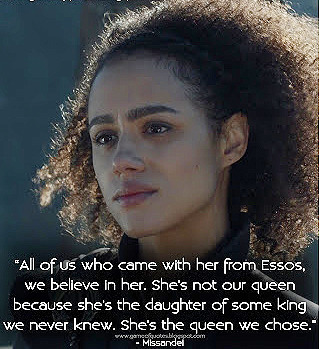
It’s like she’s heading the welcome parade into Jonestown…
Leaving that disturbing imagery aside, why is this scene so deeply unsatisfying?
In order to answer that, what we really have to ask ourselves is what is the purpose of this scene? There are no useless scenes in scriptwriting. Every scene must serve a part in telling the story.
Is the purpose here to show that Missandei idolizes Dany? It can’t be. We already know that. Is it foreshadowing for Davos moving to Narth because it sounds like a “liberating” place? Doesn’t quite sound right.
It must be a scene that pays service to the Tyrion/Jon scene where Jon is advised to seek out people close to Dany. So the purpose of this scene is to see Jon learning some very positive things about Dany, from her number one fan. This feels like a very natural progression, because we’ve seen this done in stories a million times before. So I think most people will not really look very deep into this scene to really realize why by the end of it, the romantic plot hasn’t advanced at all.
The reason why this scene doesn’t serve its romantic purposel is because the whole structure of it is wrong.
Let me explain. We start the scene with
Davos: What do you think about her?
Jon: I think she has a good heart.
This line is problematic to begin with because we have seen Dany do nothing that would indicate to Jon that she has a good heart. Since he’s been here, he’s been turned from King to Lord, to simply Jon Snow, he’s seen her humiliate Tyrion, refuse to help him fight the white walkers and develop a troubling bended knee fetish. So what is it that would prompt him to say that?
Well … what is the number one argument that Dany’s fans always bring up when people criticize her? I think it goes along the lines of: But she was doing it for the right reasons. She’s a good person … She has a good heart.
I think this is the writers at their most trolliest giving people deeply invested in this ship something to cling onto when saying that this romance does actually exist, while simultaneously making people that dislike the ship tremble in their boots a little at the thought that it might be reciprocal.
And just to make anti-Jonerys’ tremble even more, they double down with this little gem:
Davos: A good heart? I’ve noticed you starring at her good heart.
Yeah … sorry writers, I ain’t tremblin’. I’m a woman. I’ve developed a sixth sense for men checking out a girl’s … wolf bits. It looks a bit like this …
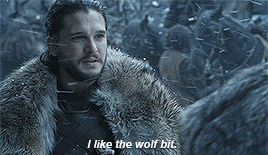
Nice try though!
How does Jon respond to Davos’ appraisal? Does he get flustered that he’s been found out? Does he reject it outright as a vile falsehood?
Jon: There’s no time for that.
And here I must ask again: what do the words that Jon ejects from his mouth mean?!? Does he use the excuse of the white walkers to hide his secret attraction? Does he mean it literally? Is Dany like the Flash, so quick there’s no time to look at her cleavage? Or is he letting out his frustration at having to play out this parody while the world is on the verge of annihilation, as the political!jon theory would support?
The point is we don’t know. We can claw each other’s eyes out over this all we want. The line is left vague for a reason. We, unlike Jon for once, know nothing.
Then we get to Missandei’s speech. She’s essentially the Pope of Daenerism. The main message of her speech is
Missandei: My queen has a good heart
Great. So why did we need this scene again?!? So Jon could find out what he already said he knew? Maybe he needed some reinforcement. What was his reaction to Missandei’s ode, you ask?
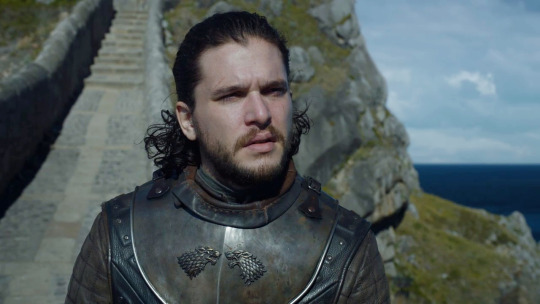
Can’t read my … can’t read my … nobody can read my poker face …
Followed by the old, faithful romantic classic
Jon: Is that a Greyjoy ship?!?
So … a 2 min scene of writers trolling and an aerial shot of a ship … and absolutely no progress on the romance front. No wonder this scene is frustrating.
Humor me for a moment and imagine this scene in a different sequence.Move Missandei’s speech in the beginning and end the scene with Jon saying Dany has a good heart. Eliminate the ship altogether. Doesn’t it feel like a better set-up and make the scene less repetitive and more romantic?
Scene 8:
youtube
The first part of this scene is breathtaking. Leaving aside everything else, it’s astounding to see how far television has gotten in terms of what they can present on screen. Everything from the CGI, to the scope of the shot, to the colors, music and scenery is stunning. It’s perhaps the most memorable moment of the entire season. Plot wise, it’s also extremely meaningful.
Because of the stunning imagery, this has led people to interpret it as romantic in nature. But it isn’t. This is not about the Jon/Dany romance at all, but rather about R+L=J, about Jon himself and his nature. We’ve never seen another person apart from Dany get so close to Drogon before, let alone pet him. And all this is punctuated by Kit Harrington playing Jon as completely overwhelmed. As he should be. He’s doing something that people haven’t been able to do for 300 years and, more importantly than that, he’s doing something that feels strangely familiar to him.
That’s why all those gif sets showing Jon as completely in awe that imply he’s looking at Dany are so frustrating. Watch this scene again and you’ll see that he’s holding eye contact with Drogon throughout, punctuated even by a close-up of the dragon’s eye looking at Jon. It’s only Dany that looks at him curiously, seeing him interact with her favorite pet/child.
If you’re going to frame those looks as romantic in nature, you shouldn’t be shipping Jonerys at all but rather … Jonon? Drojon? Can’t decide …
So, if we eliminate this first part, and concentrate solely on Jon and Dany’s conversation, what happens?
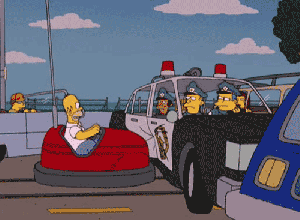
They disagree on whether fire breathing lizards are beautiful, gorgeous, beasts or children.
Dany: They are not beasts to me. They are my children.
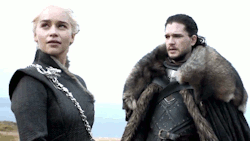
Jon’s face says it all really … (gif courtesy of @thelawyerthatwaspromised)
No resolution is reached on this front. So Jon abruptly changes the subject.
Like I said in my previous post, romantic couples don’t reach this type of communicational impasses. They duke it out to the end or reach common ground. That’s what makes them work.
But it gets worse. Not even the awkward transition to another subject leads to anything.
Jon: You weren’t gone long.
Dany: No.
Jon: And?
Dany: And I have fewer enemies today than I did yesterday.
Silence … Very awkward silence … Dany literally has to push the conversation forward and …
Dany: You don’t know how you feel about that
Jon: No, I don’t
…it still doesn’t go anywhere. The writers keep breaking the momentum of their dialogue over and over again and frustrating both Dany and the audience.
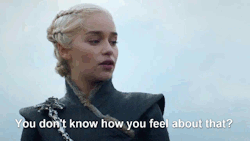
Just look at that face. That’s the face I pull every time I come back home from a bad date.
But Dany is a stubborn girl. She tries again, with another awkward change of subject.
Dany: When you first came here, Ser Davos said you took a knife to the heart for your people.
Jon: Ser Davos gets carried away.
This would have been the perfect time for Jon to open up, at least a little bit. He thinks she has a good heart after all, right? But no. He not only avoids the subject, he lies outright. Why? Why would he lie? And more importantly why do the writers want to keep Dany at arm’s length from Jon this far into their relationship?
Dany doesn’t completely believe him but have no fear!
Luckily the plot intervenes before Jon is forced to answer. Heaven forbid that we get a meaningful conversation between 2 people that are about to have sex a few scenes from now. The less 2 people talk, share their feelings and experiences, the more impactful their romance is. Isn’t that how it goes?
The introduction of Jorah in this scene is significant because the dreaded competitor for the maiden’s heart is a trope used to excess in romantic plots.
No matter that the writers haven’t built up enough of a connection between Jon and Dany for us to feel the stakes of introducing this new element into their romance. Finally, now we have the opportunity to see Jon look jealous and feel that his bond to Dany is threatened by someone with whom she shares so much history. Sure he might be standoffish and cryptic when it’s just the two of them but surely he won’t be able to control himself when he sees his lady love hug another man. So what do you say, Jon?
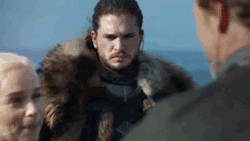
P p p poker face, p p p poker face
Scene 9:
youtube
I won’t analyze this entire scene because most of it is not linked to the romantic subplot and also … it’s stupid. The whole hunt plot is stupid and Tyrion should lay off the bottle immediately. It’s affecting his intellectual skills.
We will resume ourselved to the 3 romantic beats withing the scene.
So, we start promisingly enough with Jon letting everyone know that Arya and Bran are alive. There’s no context as to why he decided to announce this in front of a room of strangers so read into that what you will. Perhaps he wanted to share the happy news with Dany …
Dany: I’m happy for you
Silence
Dany: You don’t look happy.
Silence
Perhaps we could tell from his expression?
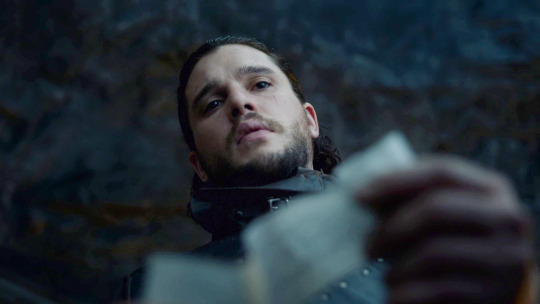
Lady Gaga ran out of lyrics, you guys … sorry about that …
End of topic. No need to explore this momentous event for Jon or have the opportunity to see him sharing his happiness with the love of his life. That’s what fanfiction is for.
Then there’s the part when Jorah offers to hunt down a zombie to bring back as trophy for his heart’s desire. This has, of course, prompted people to speculate that Jon decides to go on the hunt in order to one up him in Dany’s eyes. Which is not outlandish, per se. That’s what happens in a love triangle after all.
However there are two issues with this.
One - there is absolutely no one in the audience that thought Jon would not go on this hunt since the moment it was proposed. He was Lord Commander of the Night’s Watch, he’s the only one in that room who has gone beyond the wall and the only one who has actually fought the army of the dead. Jorah or no Jorah, the scene would have ended with Jon going on the hunt. That sort of undercuts the whole jealousy angle.
Secondly there’s this peculiar sequence of lines after Jorah says he’ll go:
Jon: The free folk will help us
Davos: They won’t follow Ser Jorah.
Surely, if jealousy was what the writers were going for, those two lines should have been inversed. That could be construed as an attack on Jorah’s abilities by Jon and could lead to a starring context between the two, right before they’d take their shirts off and duke it out in the rain while Dany watches in rapture from the window.
Does that sound like a ridiculous, over the top, infantile scenario? Sure … But let’s make one thing very clear. Writers do not introduce romantic triangles into stories because they want to keep it classy. They introduce it so that at some point we can end up here:
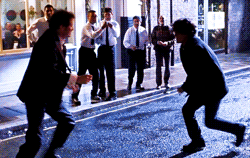
The last of the romantic plot in the scene comes right after Jon says he’ll go on the hunt.
Dany: I haven’t given you permission to leave.
This line pulls double duty in terms of plotting. It just does it in the wrong direction. On one hand, it torpedoes the love triangle because Dany clearly doesn’t want to let Jon go while she doesn’t have that many qualms about Jorah potentially freezing to death or getting killed. So with 8 words a triangle that started a scene ago has been turned back to a straight line for the audience. That’s no way to build up tension between your characters.
The second thing it does is that it shows, once again, just how one sided this whole relationship is. Because Jon is not at all touched by Dany’s concern for his well-being.
In fact he seems rather annoyed by her attempt.
Jon: With all due respect, your Grace, I don’t need your permission. I am a King.
This has been described as a ‘panty dropping’ line. Except that depending on where your alligencies lie, the interpretation for why it pulverizes underwear is different. People that are invested in this ship say that this is the moment Jon proved himself a good King to Dany. People that reject this ship see it as the moment when Jon regains his agency and status, after being humiliated by not only the queen, but also her servant when denied his rightful title.
Again, this is a problem. Because you shouldn’t have two contradictory explanations for one line this late in the plot. By this point we should all agree on the basic meaning behind what Jon says, whether we like the pairing or not.
Also:
Jon: I put my trust in you … a stranger […] Now I’m asking you to trust in a stranger.
We end this scene with Jon calling the two of them ‘strangers’. It kind of feels like we’ve been through 9 scenes and three episodes of romantic build-up and we have nothing to show for it.
Scene 10:
youtube
This scene has been analyzed a lot so I won’t dwell too much on it. The reason why it’s gotten so much interest is because of the ‘look back’ trope.
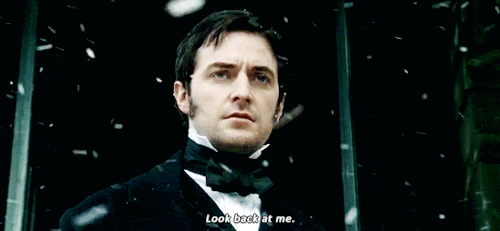
Jon not looking back is not, in and of itself, a problem. In isolation, it can be seen as a missed opportunity on the writers’ part. Adding the fact that Dany does follow him with her eyes for quite a bit just like the lovely John Thornton does with Margaret Hale in the gif above, does put a blemish on the whole thing.
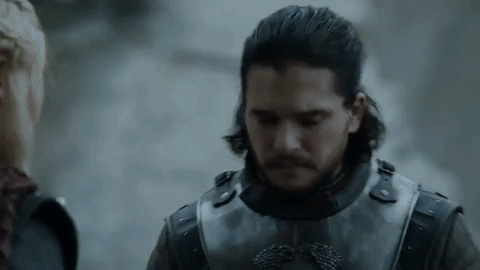
But then the writers for some reason double down on this motif by having Jorah look back at Dany. And then the camera also includes Jon pointedly NOT looking back.
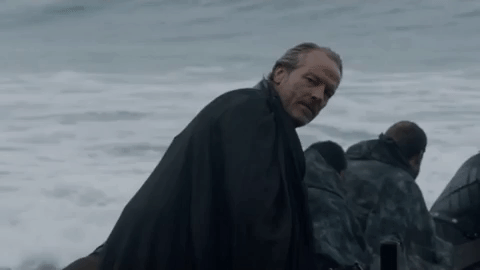
Look at the boy go … It’s like he’s trying out for the Forest Gump remake. Run, Jon, run!
Once you put all of these elements together in one scene it becomes less of a frustrating lack of romantic fulfillment and more of an intentional message that is very hard to ignore.
But let’s leave that to the side and talk about their last words to each other.
Jon: If I don’t return, at least you won’t have to deal with the King in the North anymore
Dany: I’ve grown used to him
Jon: I wish you good fortune in the wars to come, Your Grace
I’ve already pointed out in my first post of the series how deeply unwise it would be to have Jon say good-bye to Dany by using Mance Rayder’s last words to Stannis if we were to look at this scene in a romantic way.
It isn’t just the fact that Stannis and Mance were enemies. It’s also problematic because Mance was on his way to being burned alive for not bending the knee. Fire is something that the audience connects to Dany immediately. And what was the main bone of contention for these 2 characters throughout Jon’s stay on the island?
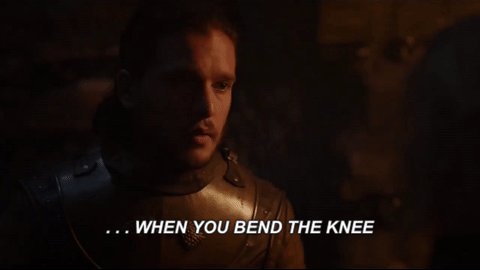
Aside from that, the dynamic between them is exactly the same. Dany’s attempt at warmth and intimacy is flanked by two general, formal statements by Jon, the first of which is actually a bit passive-aggressive if you remember that Dany requested he bend the knee so she could name him Warden of the North.
Also, this is put in direct contrast with the way Jorah says good-bye to her.
Dany: We should be better at saying farewell by now.
Jorah: Your Grace, I …
Jorah’s line is interrupted by Dany grabbing his hands. This touch elicits such a powerful emotional response from him that he can’t continue his train of thought. He simply bends his head and kisses her hand.
If you were saying good-bye to someone you love, which one of these two responses would feel more bitter-sweet and romantic? Which one would you like to receive?
If you say Jon’s …. Well then:
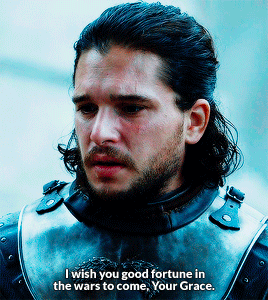
(source: @dreamofspring)
Thank you guys so much for all your great feed-back and a special thank you to @thelawyerthatwaspromised for supplying me with some of the gifs in this post. They were a life saver. The rest of the gifs and clips also do not belong to me. I picked them up from all over the place so if you recognize your work, let me know and I will add the source below the pic. Thank you!
Also:

stay tuned for part 4
336 notes
·
View notes
Text
The Crow Review: A Visually Striking but Emotionally Hollow Reboot

When news broke that Rupert Sanders would helm a reboot of The Crow, with Bill Skarsgård cast as the iconic avenger Eric Draven, there was a mix of trepidation and anticipation among fans of the cult classic. Based on the 1989 comic book series by James O'Barr, The Crow had a troubled legacy, with each successive film falling further from the haunting beauty and raw emotion of the original 1994 film. Unfortunately, this latest iteration, despite a promising premise and a talented cast, fails to resurrect the spirit of its predecessors in a meaningful way.
https://www.youtube.com/watch?v=djSKp_pwmOA
A Fresh but Rushed Take on Eric Draven’s Backstory
The film introduces a new take on Eric Draven’s backstory, portraying him as a troubled youth who loses his beloved horse and endures a strained relationship with his alcoholic mother. This early glimpse into Eric's past aims to lay the groundwork for his emotional depth but instead feels like a rushed exposition dump, lacking the subtlety and nuance needed to engage the audience from the start.
In the present day, Eric resides at an institution for troubled youth where he meets Shelly, portrayed by FKA Twigs. The two form a bond, a bright spot in the otherwise grim setting. Shelly’s backstory, involving her escape from crime lord Vincent Roeg and a compromising video, offers a glimmer of intrigue. However, the screenplay by Zach Baylin and William Schneider struggles to flesh out her character beyond the role of a damsel in distress, which feels like a missed opportunity given FKA Twigs' capabilities.
As Eric and Shelly's relationship blossoms through their shared love of music, the film momentarily finds its rhythm, offering glimpses of the tenderness and passion that drove the original story. However, this is short-lived, as Roeg's men quickly find and murder them, propelling Eric into the afterlife where he is tasked by a spirit guide, Kronos, to avenge their deaths.
Skarsgård's Performance: A Mixed Bag
Bill Skarsgård as Eric/The Crow is a casting choice that promised much but delivers inconsistently. Skarsgård brings an eerie, almost ethereal quality to the role, but his performance feels restrained, never fully capturing the anguished intensity that Brandon Lee famously brought to the character. Moments that should resonate with raw emotion often fall flat, leaving the audience detached rather than empathetic.
FKA Twigs as Shelly is a standout, though her character is given limited scope. Her chemistry with Skarsgård hints at a deeper connection, but the script doesn't allow it to flourish. Danny Huston as Vincent Roeg brings a menacing presence, yet his character lacks the complexity to make him a memorable villain. Josette Simon as Sophia and Laura Birn as Marian offer competent support, though they, too, are underutilized in a narrative that feels overstuffed yet underdeveloped.
Visual Excellence but Inconsistent Direction
Rupert Sanders is no stranger to visually arresting films, and The Crow is no exception. The cinematography by Steve Annis is lush and atmospheric, with gothic hues and shadowy landscapes that evoke the dark, moody essence of the original. The scenes in the afterlife, particularly the warehouse filled with crows, are visually striking and hint at a world brimming with untapped potential.
However, Sanders' direction falters in pacing and tone. The film oscillates between rushed action sequences and languid, reflective moments without finding a harmonious balance. The relentless vengeance plotline grows repetitive, and the emotional beats fail to land with the intended impact, leaving the narrative feeling disjointed.
Themes of Love, Loss, and Vengeance Fall Short
The central themes of love, loss, and vengeance are core to The Crow mythology, but this reboot struggles to explore them with the depth and poignancy they deserve. Eric's journey to avenge Shelly and himself should be a cathartic, soul-stirring odyssey, but instead, it feels like a checklist of revenge tropes, devoid of the profound emotional resonance that made the original so compelling.
Overall:
The Crow is a visually captivating but emotionally hollow experience. Despite a promising cast and the potential for a compelling reboot, the film stumbles under the weight of its ambitions. Bill Skarsgård’s subdued performance and Rupert Sanders’ inconsistent direction result in a movie that, while not without its moments, fails to capture the tragic beauty and raw emotion of the original.
0 notes
Text
I love it when I take an anon ask way too seriously, writing a meta in response to them, only for my meta to not show up on the tags

Hey anon! Sorry it took me a while to answer your question, but the truth is that there is no clear trajectory regarding Kata/ang in this situation, especially when we take into account that Kata/ang in the show canon was abrupt and significantly underdeveloped. More specifically on Kata/ang, both Katara and Aang’s arcs were twisted to accommodate for their endgame romance, but while Katara’s arc reaches its culmination by the end of the Final Agni Kai, Aang’s character had become inconsistent in its direction throughout all of season 3.
As such, two conflicting outcomes can result from this hypothetical scenario — one outcome which upholds Aang’s flaws and stagnated growth, or another outcome which forces Aang into growing, accepting, and understanding, as was the original intent behind his character.
From a broader context, Aang’s entire journey since he woke up in the iceberg has been about him reconciling his airbender and Avatar identity, and by the end of season 2 when he is with the guru, Aang is on the cusp of fully accepting his Avatar responsibilities, of letting go of his selfish attachments (or in other words, his blinding biases).
Except Aang cannot let go as he hoped he would be able to. Because his attachment to Katara is selfish, but beyond that his attachment to Katara is a replacement for his attachment to the Air Nomads — and it draws him away from his duties as the Avatar, causing him to embrace an ideal he does not comprehend. After all, the Air Nomads were not perfectly pacifistic either.


Still, just as Aang refuses to recognize the complexity in the Air Nomads’ legacies, dismissing what he may deem as an act of violence, Aang refuses to recognize the complexity to Katara’s rage and compassion, to her violent and protective nature. In my meta “On Ideals and Idealization,” I elaborate on Aang’s idealization of Katara:
Aang loves Katara, yes, but he is in love with an idealized version of her. In his mind, he holds close the idea of a gentle Katara, a smiling Katara, a compassionate and all-loving Katara. Even though he has seen her darkest moments when she bloodbends Hama - arms bent in disjointed angles, fingers curled as if manipulating puppet strings - it does not tarnish his image of her because, at this moment, she is not the persecutor, but the persecuted.
After her experience with Hama, Aang is there to comfort her and help her come to terms with the terrifying power she now possesses. With her face streaked with tears and eyes widened with horror, it is clear that this is a power that Katara does not want, that it has been thrust onto her against her own will.
The conclusion that Aang draws from this is that Katara’s inner darkness is a separate entity from her inner light, and he perceives this acquired part of her as a blemish on her inherent goodness. As such, in “the Southern Raiders,” when he witnesses how Katara’s anger and grief drive her to hunt down her mother’s killer, he equates Katara seeking closure to Katara succumbing to darkness, tainting her purity and compassion in the process.
Thus, given Aang’s reaction to Katara’s bloodbending, he may be inclined to love her in a piteous, nearly-obligatory manner. He’ll love her as the victim who lost sight and control and he’ll love her as a being of compassion and pacificity, but nothing more. Just like in the Southern Raiders, he may magnanimously grant Katara his forgiveness and his continued love even when she never asked for it. And in the end, Aang and Katara will kiss on the balcony of Iroh’s tea shop, only this time it’s not only “the hero winning the girl,” but “the bright and cheerful boy fixing the broken girl” as well.
Keep reading (This will direct you to the original post that Tumblr has yet to release from its tag-withholding prison. Also, if you liked this meta, please give the original post a reblog, I’d appreciate it so much.)
#atla#atla meta#anti kataang#anti kataang meta#zutara#aang#katara#self-promotion is the answer when tumblr is being Not Nice
11 notes
·
View notes